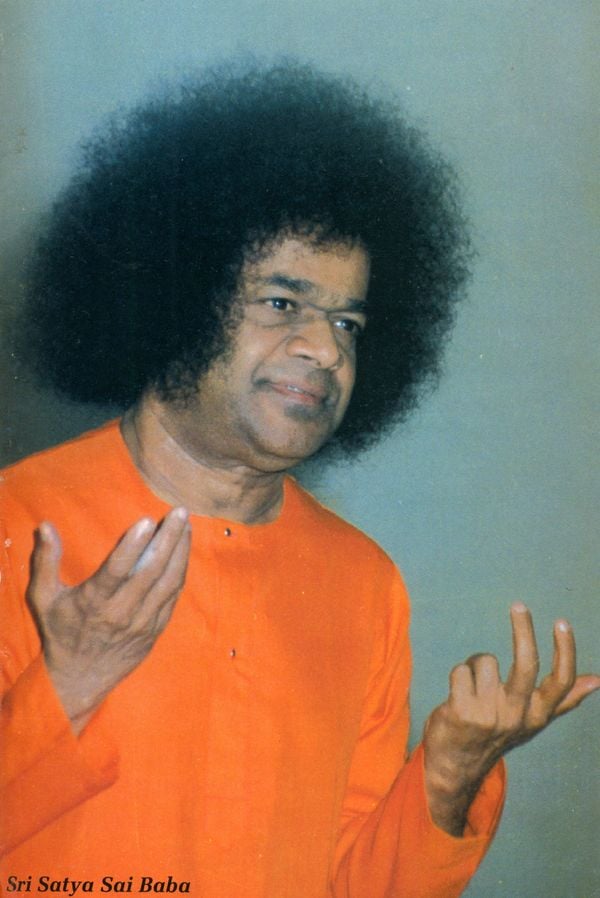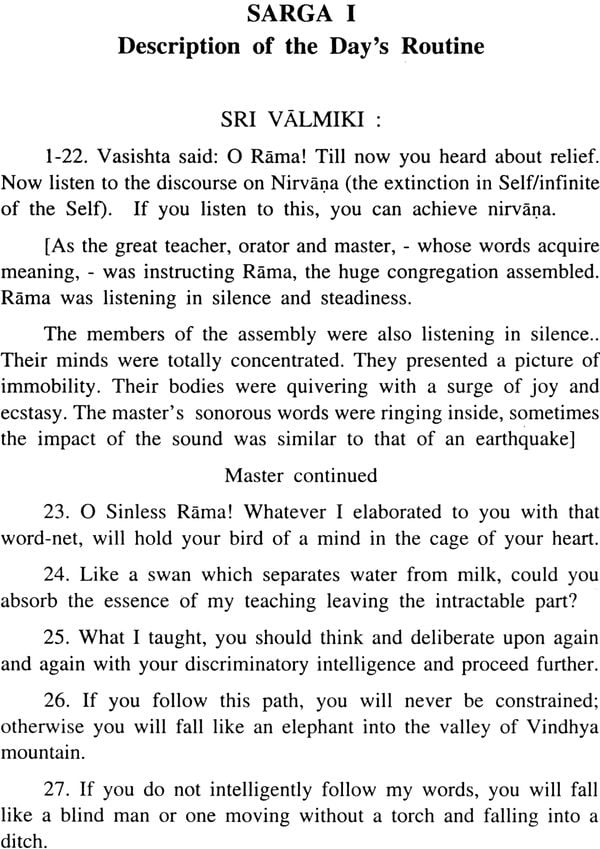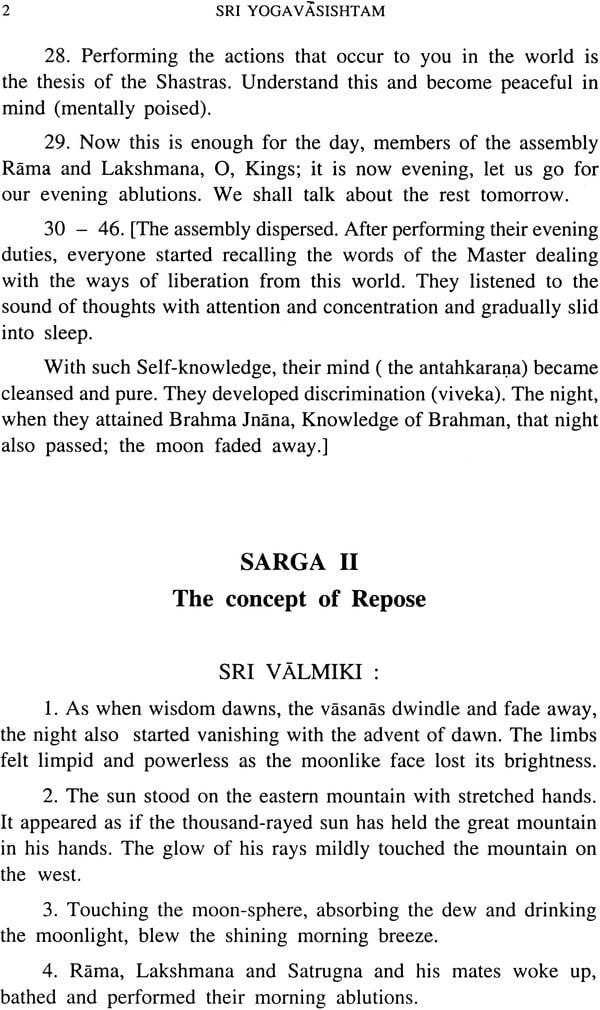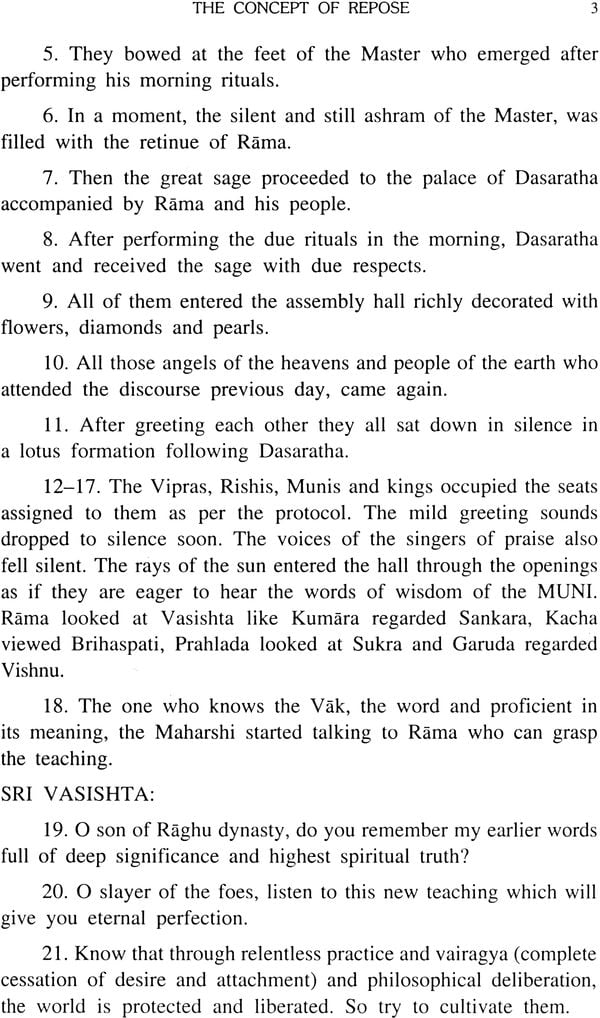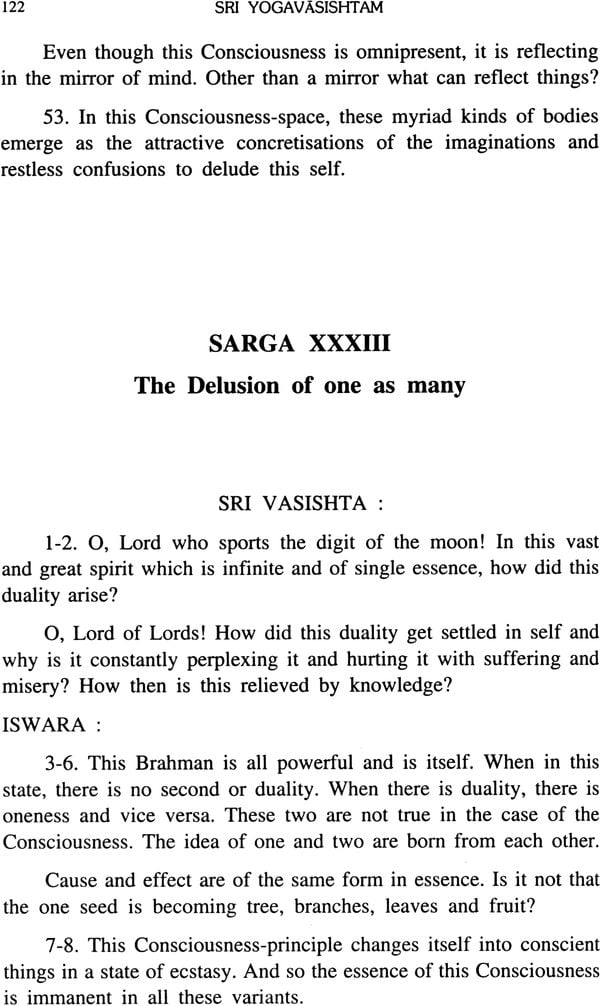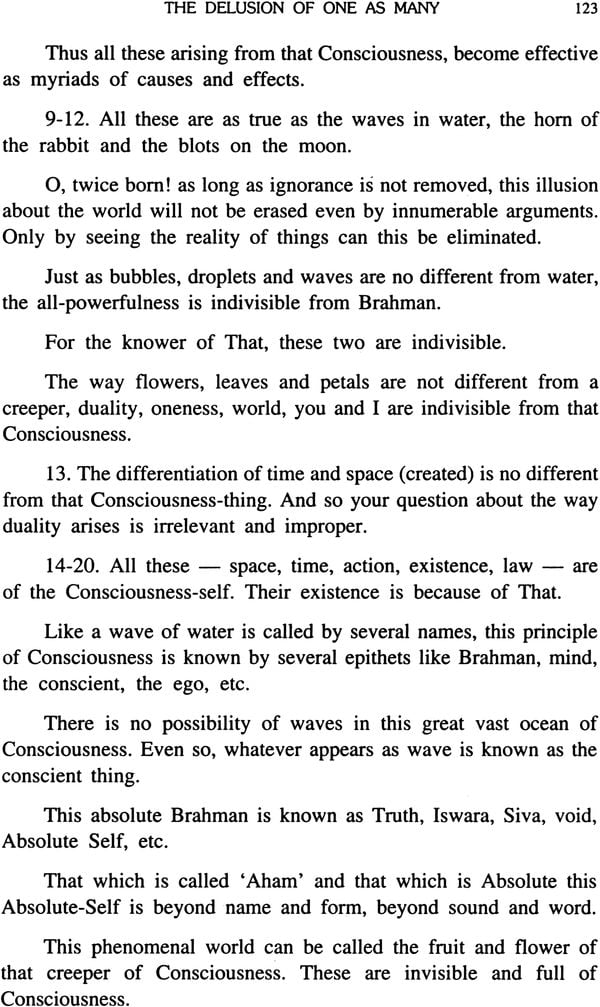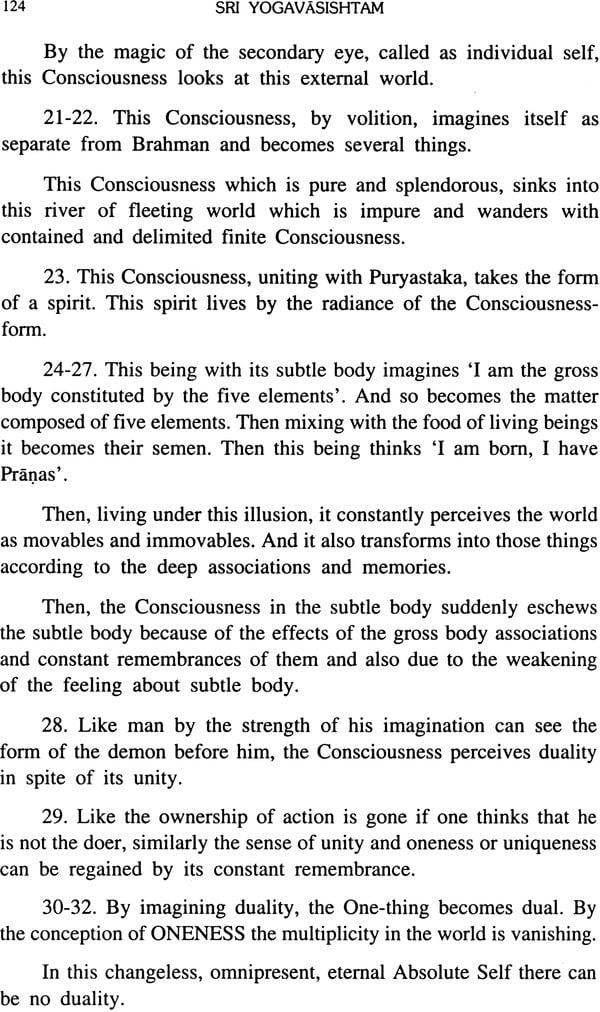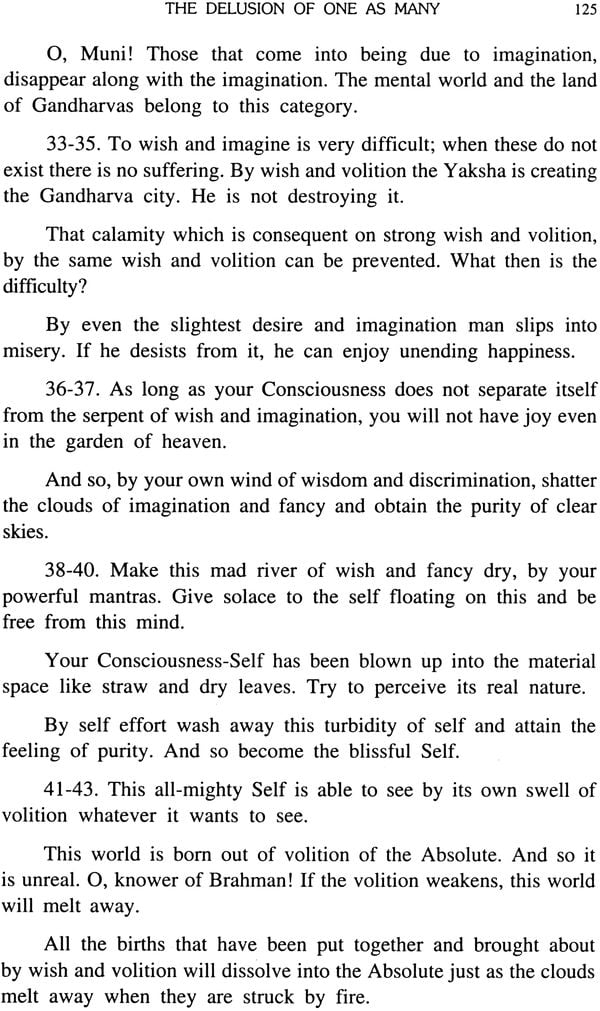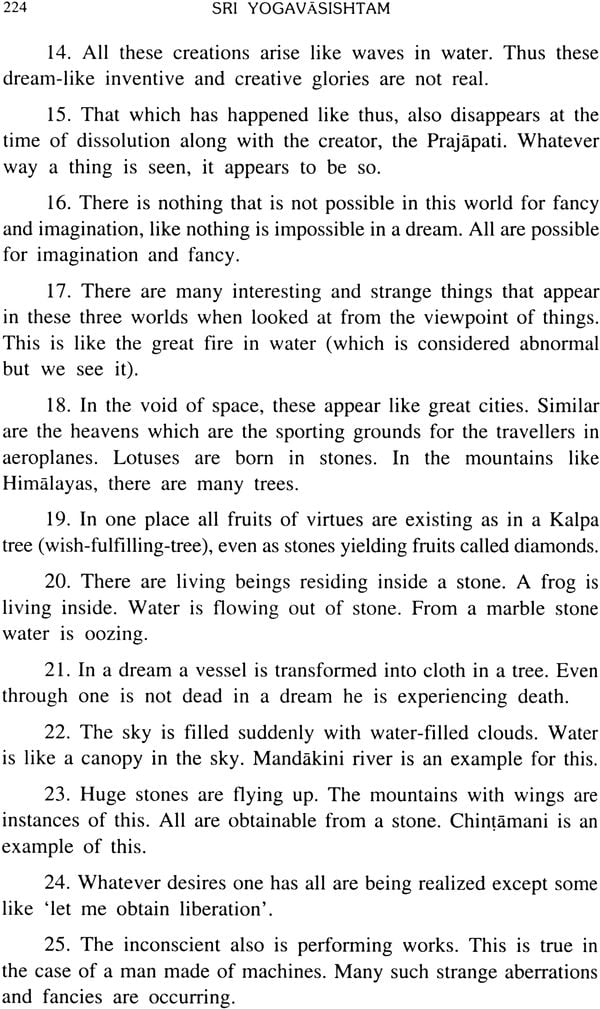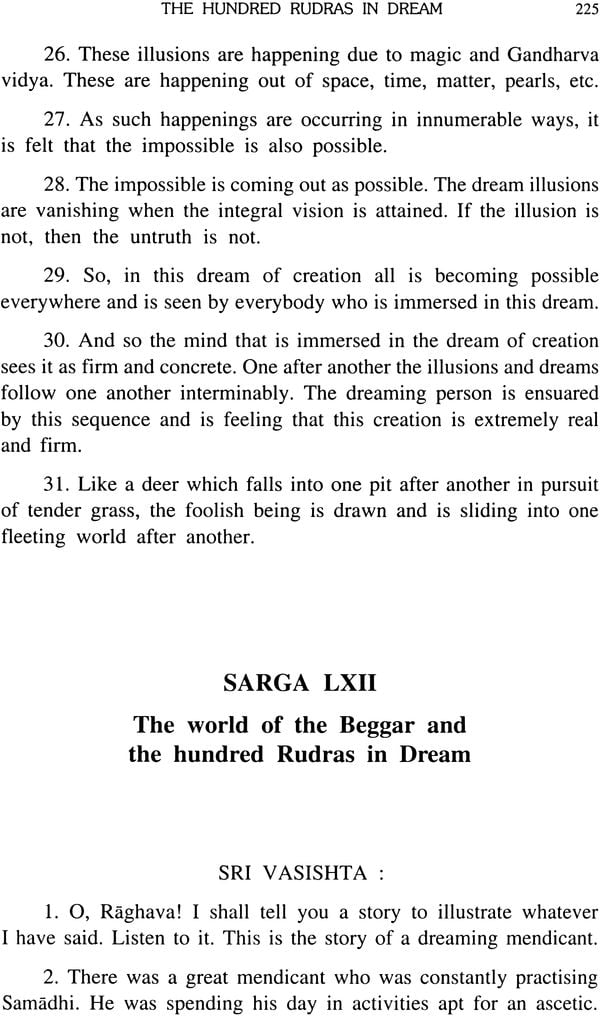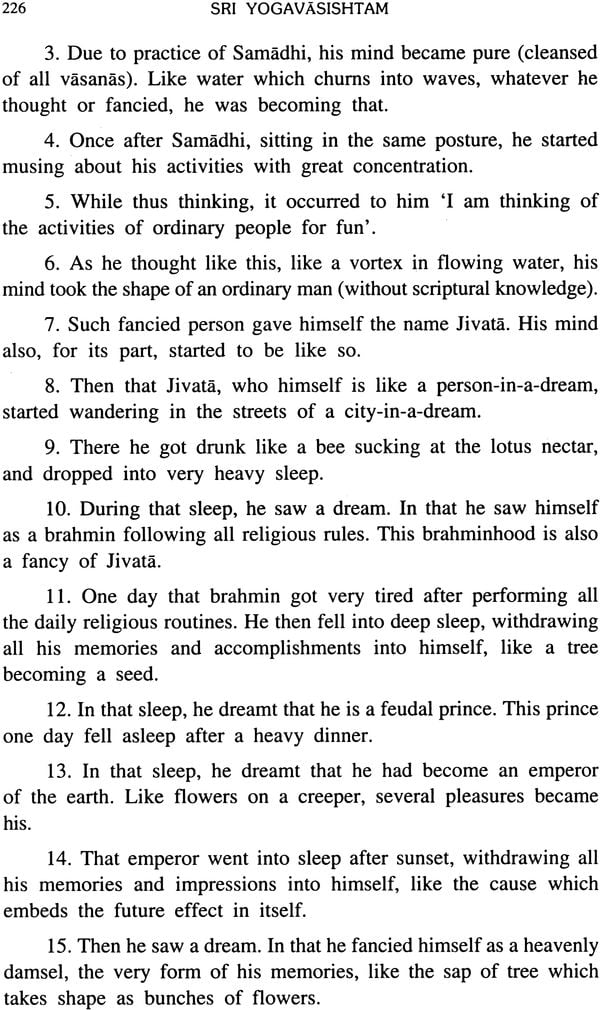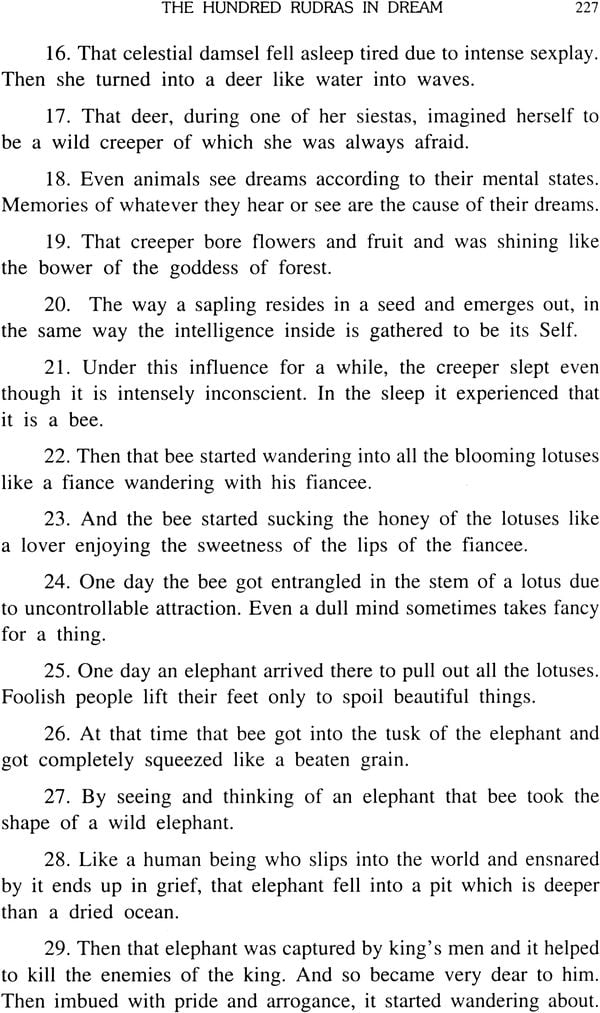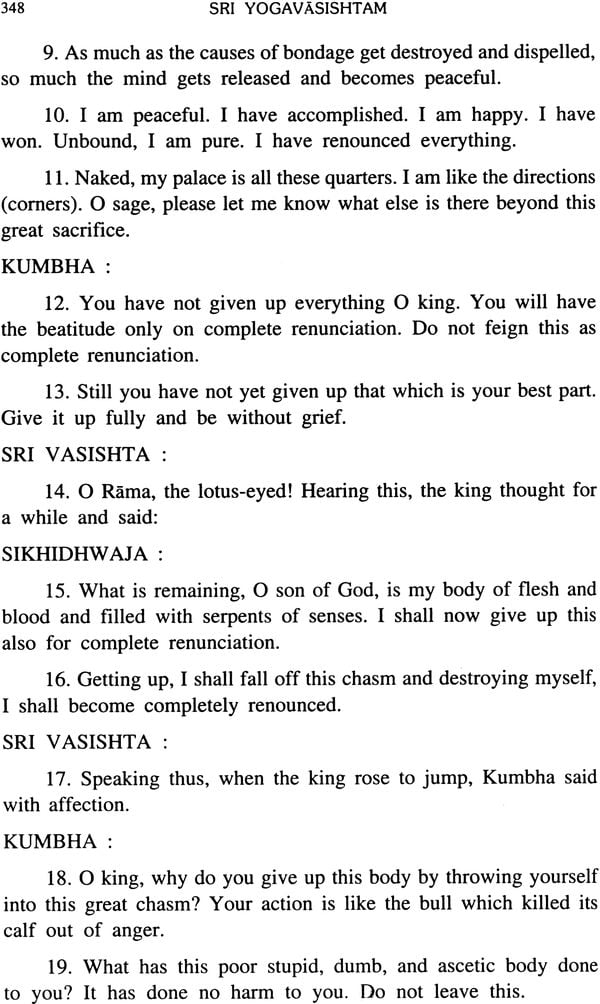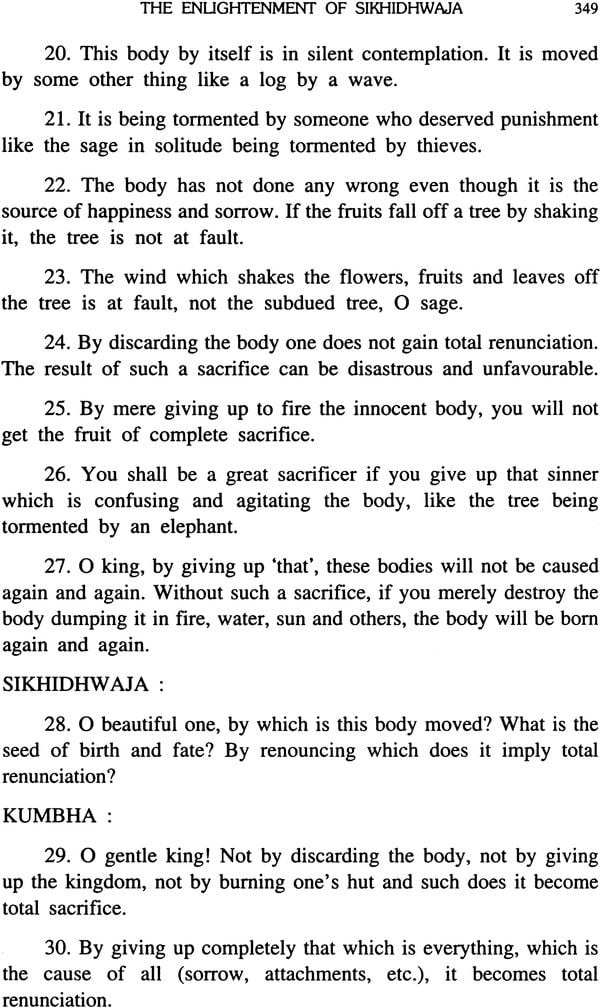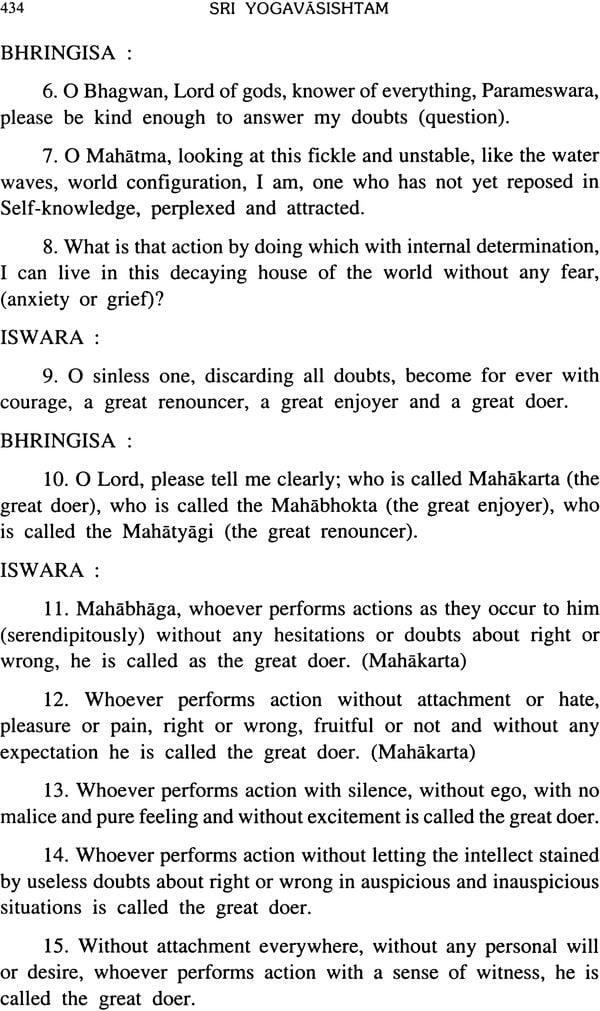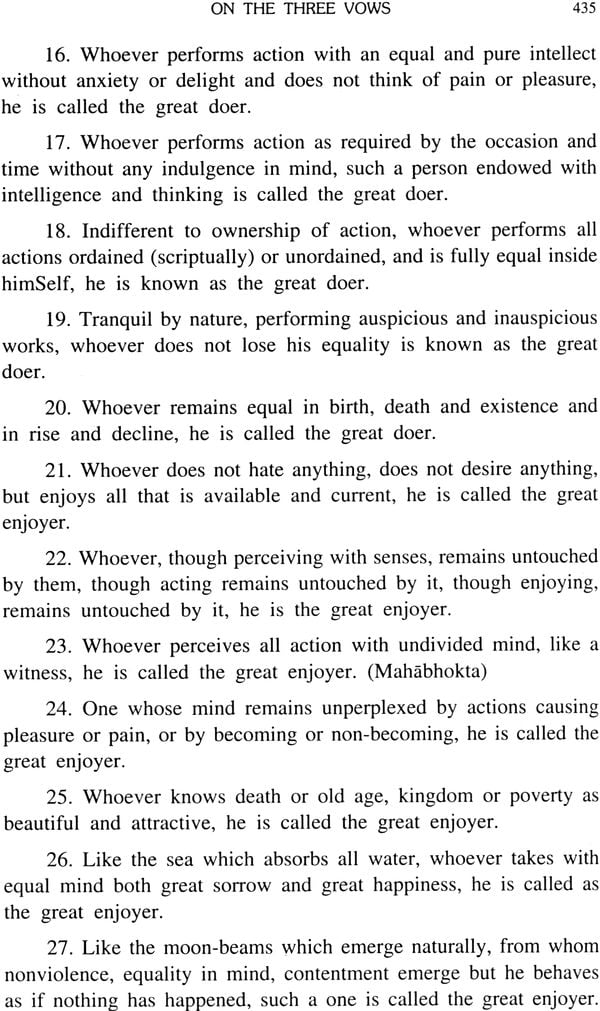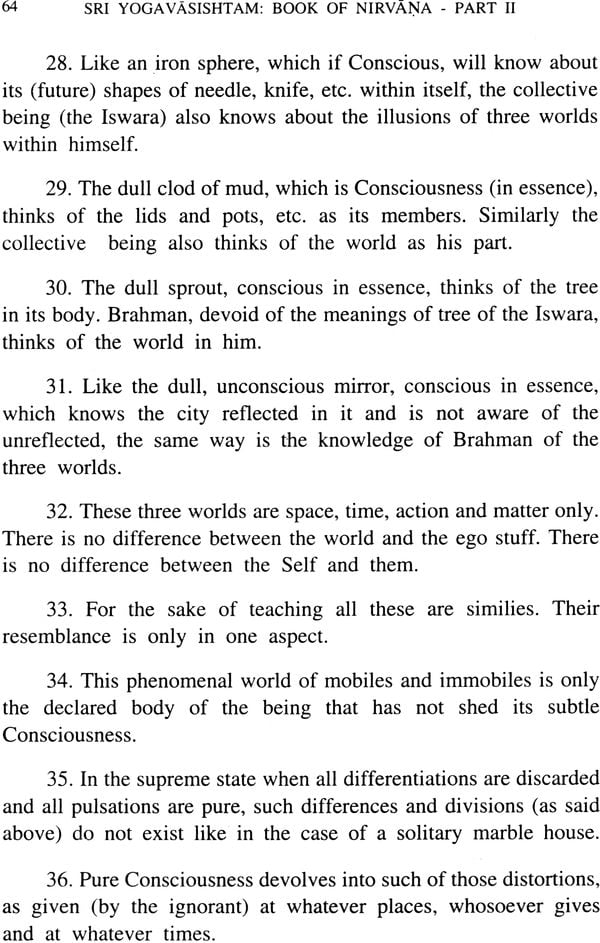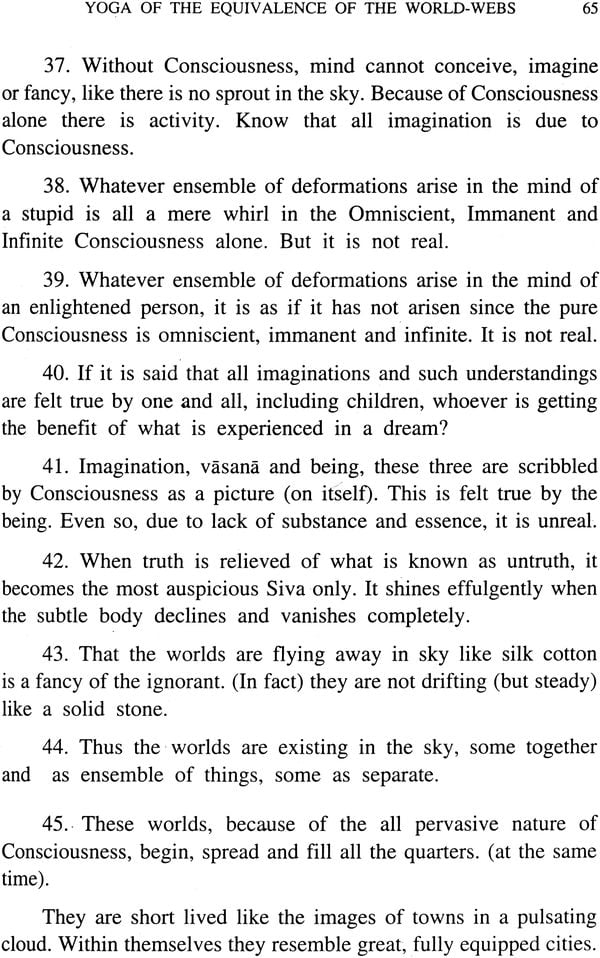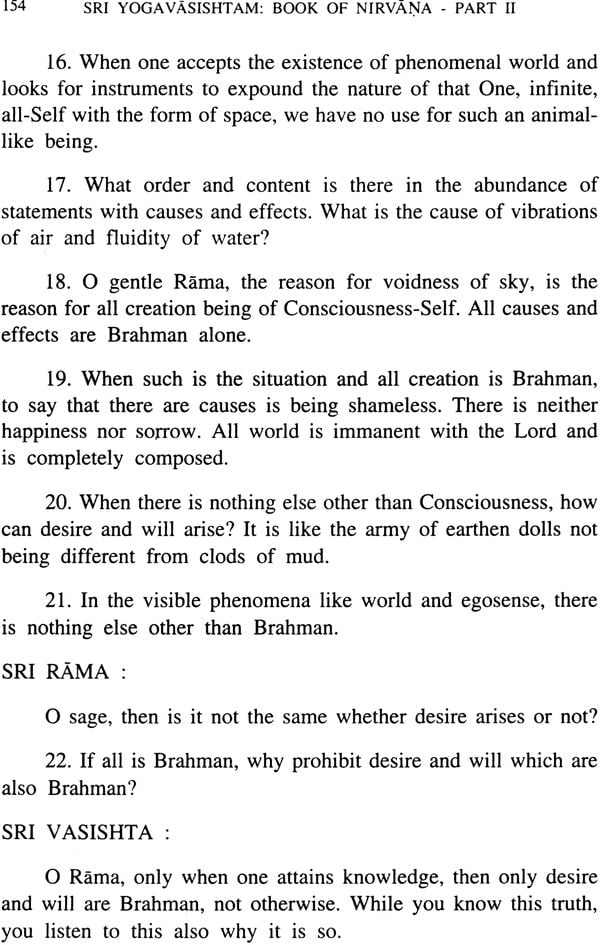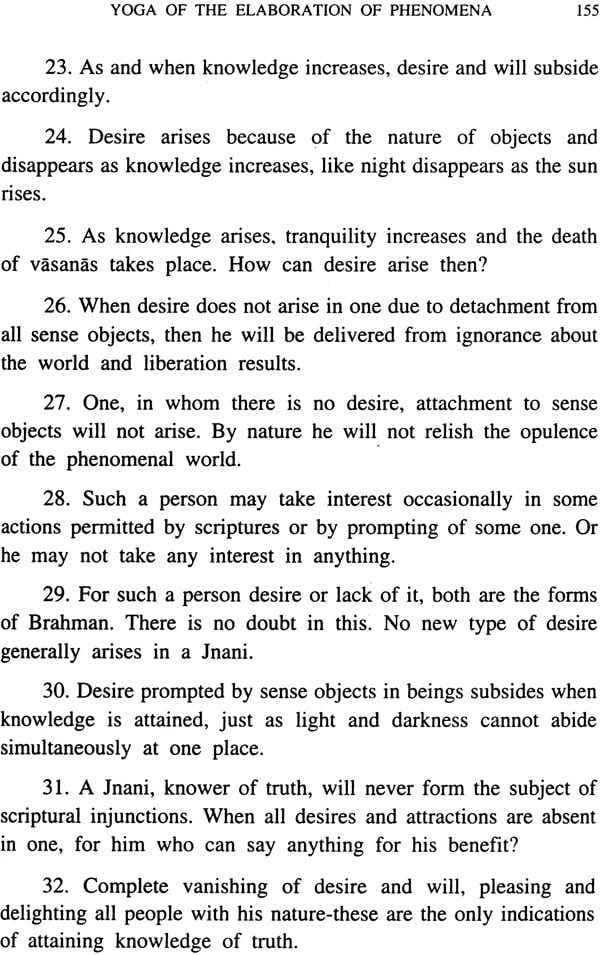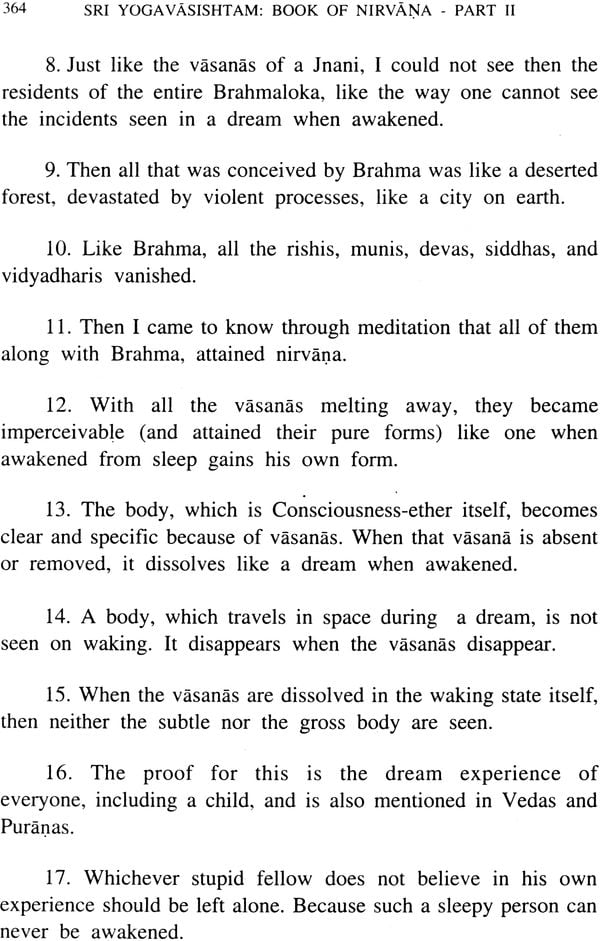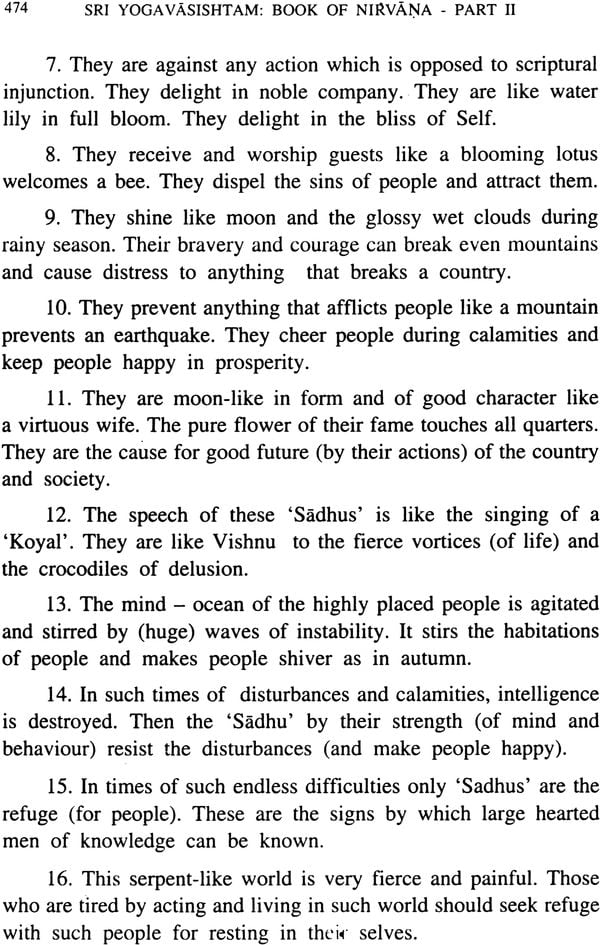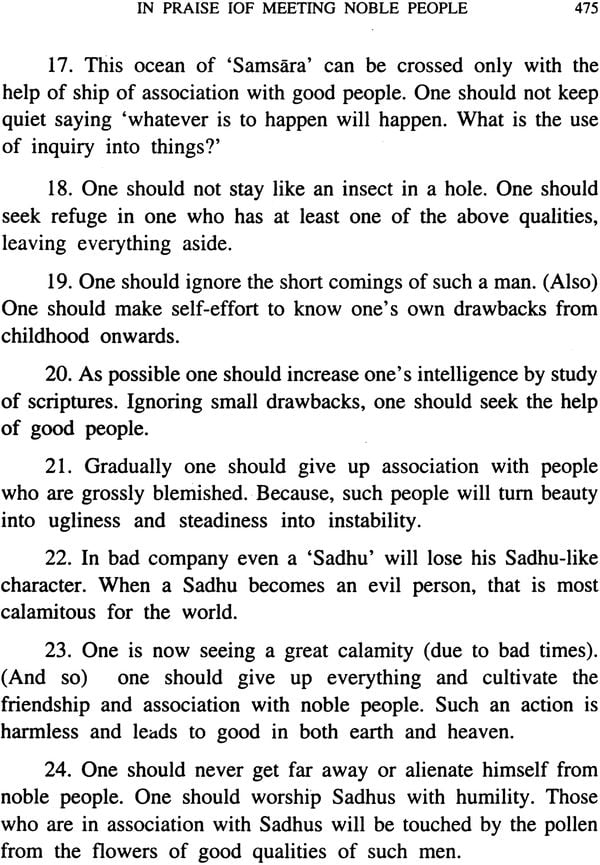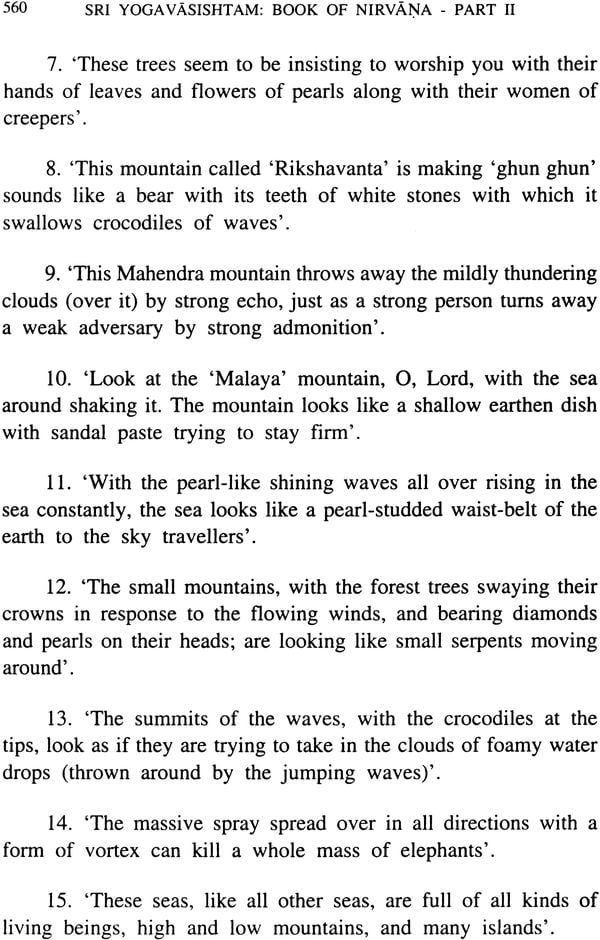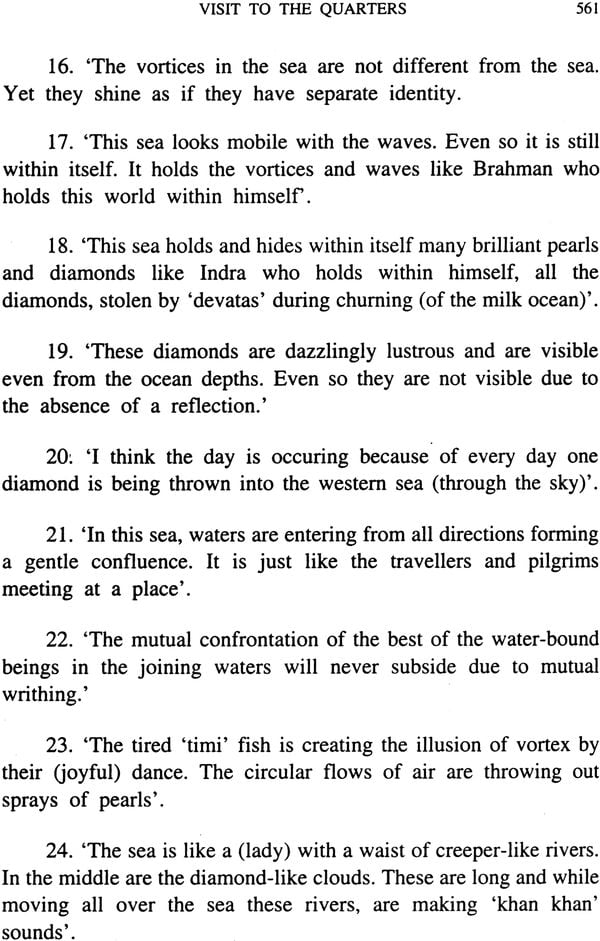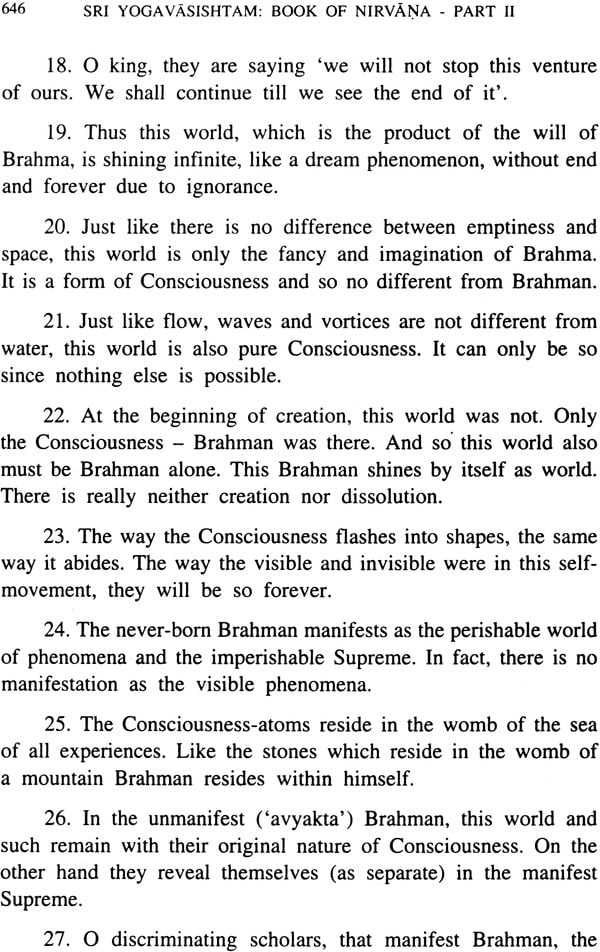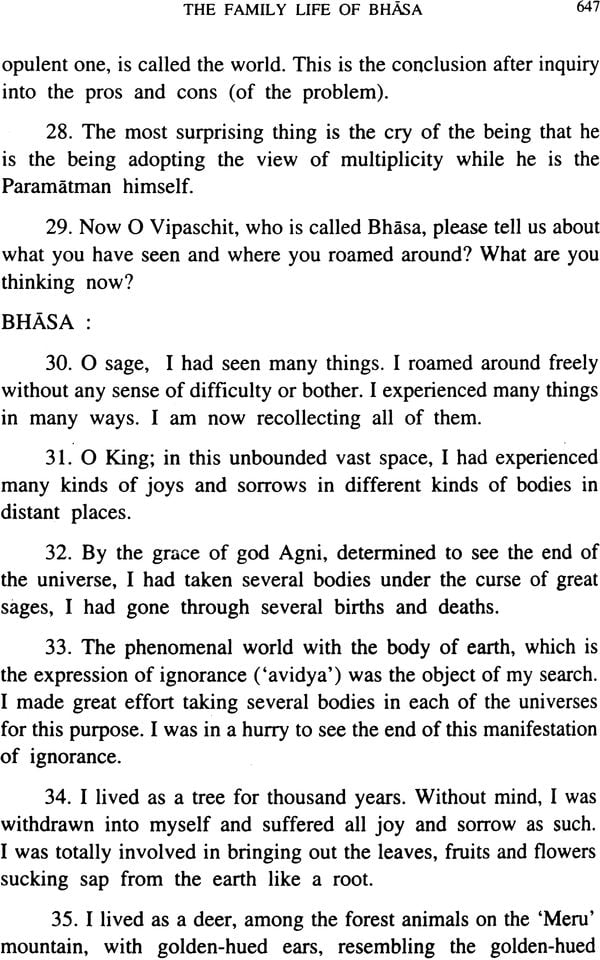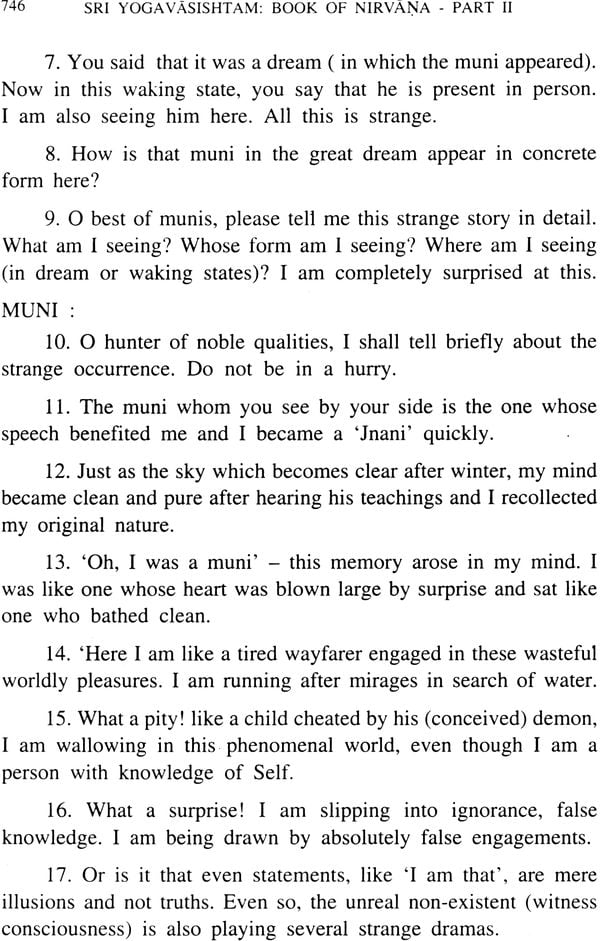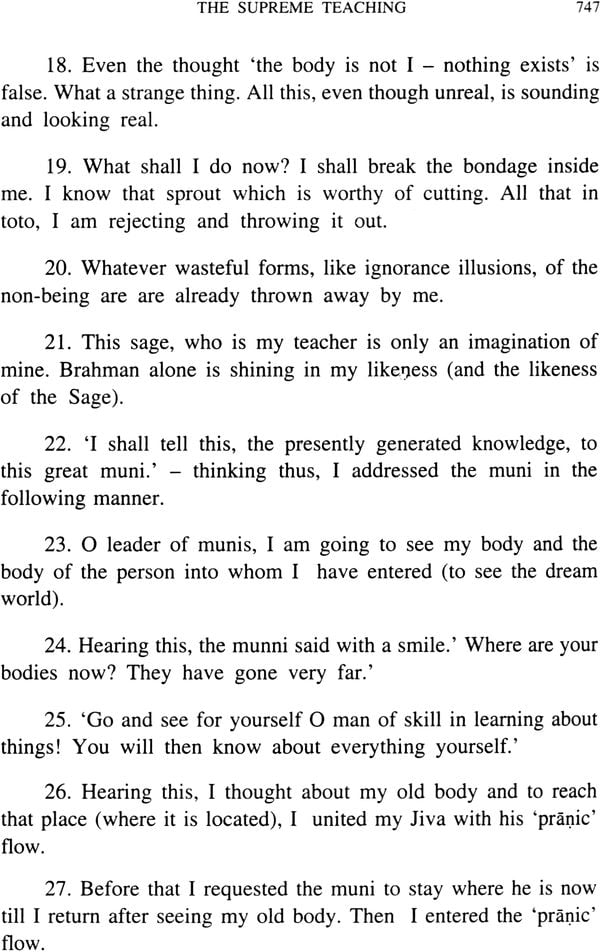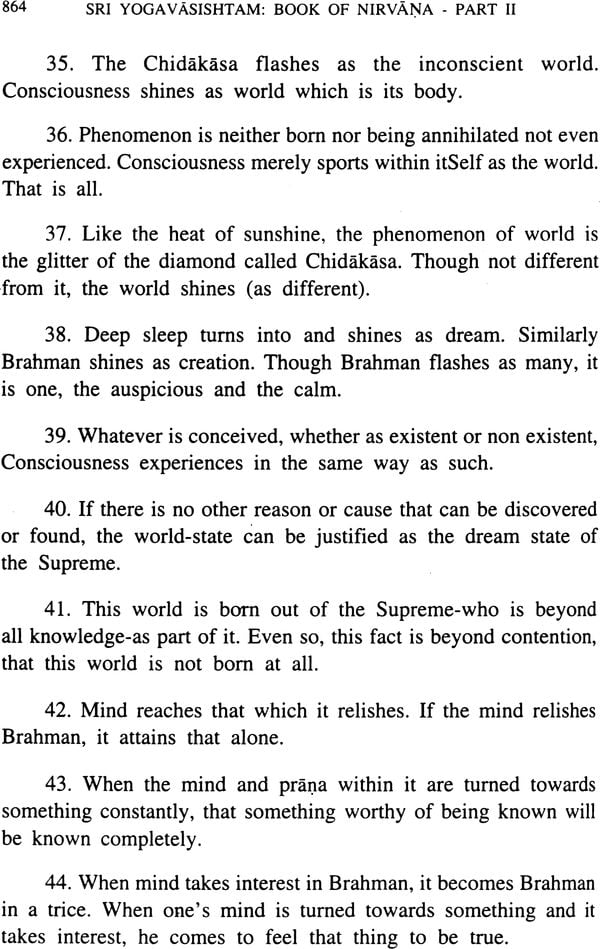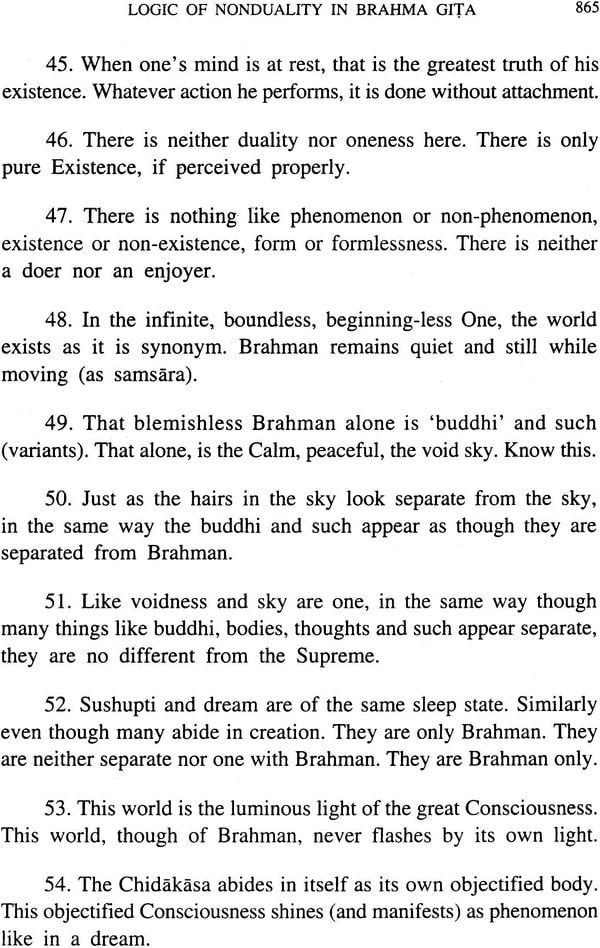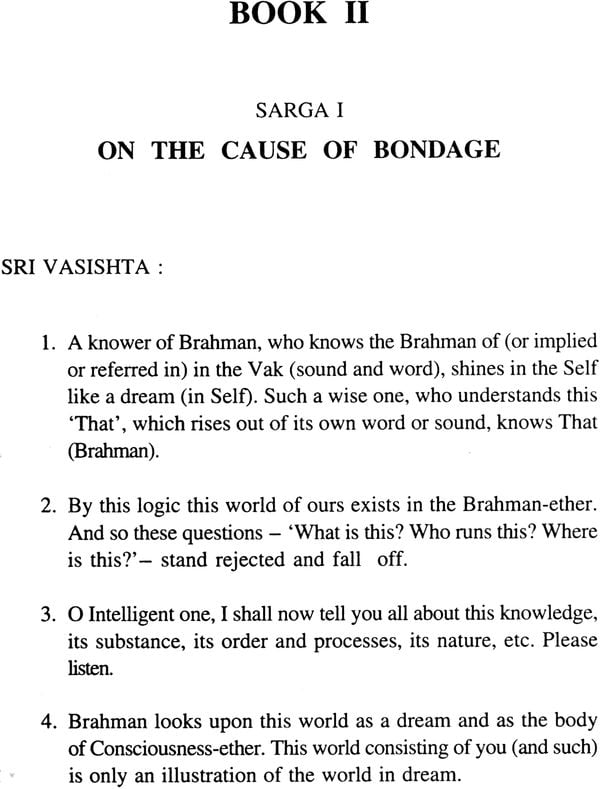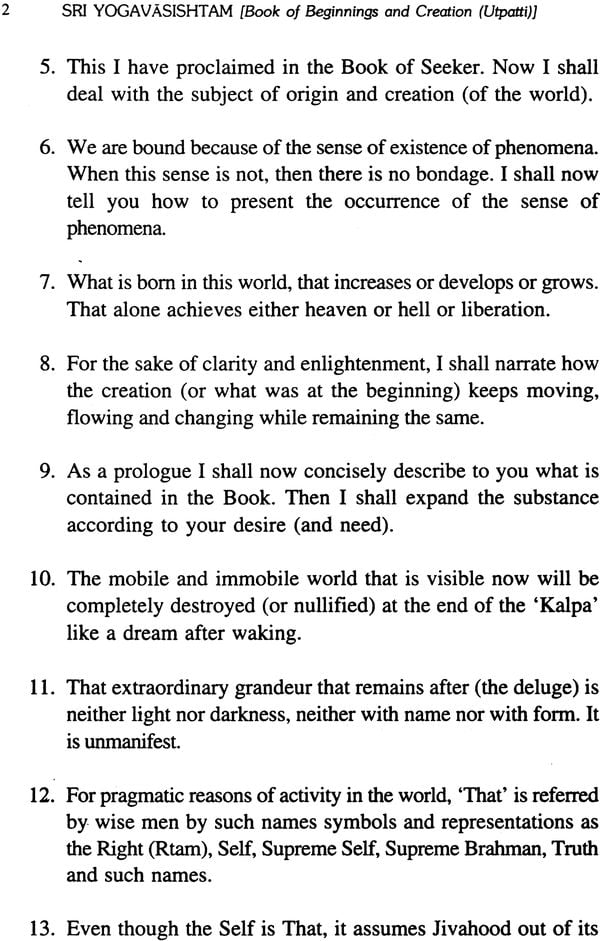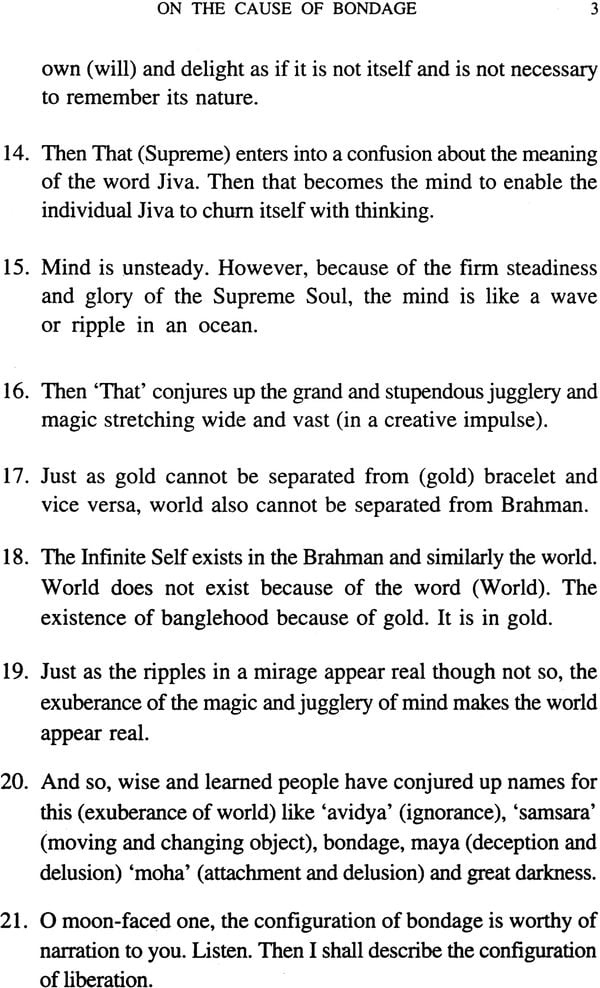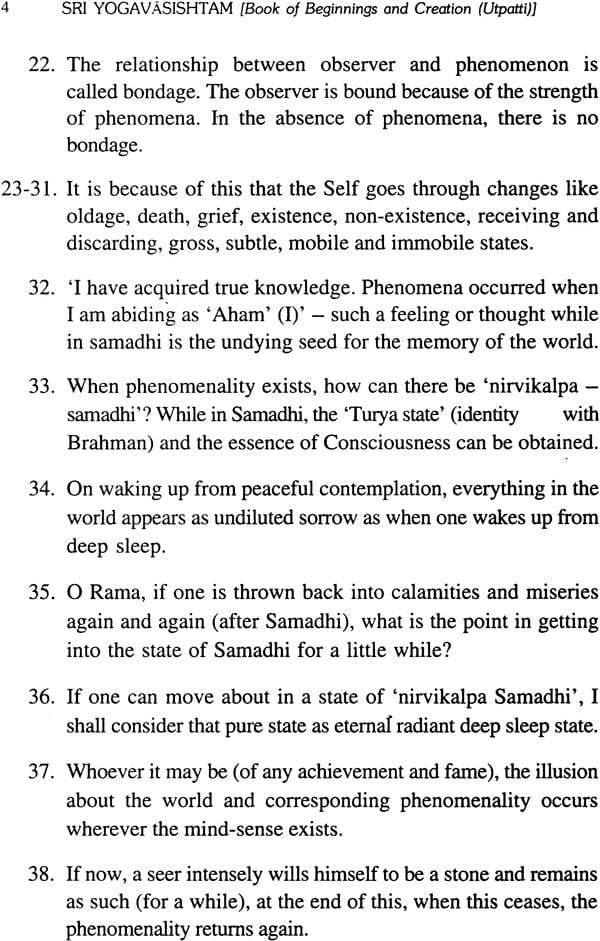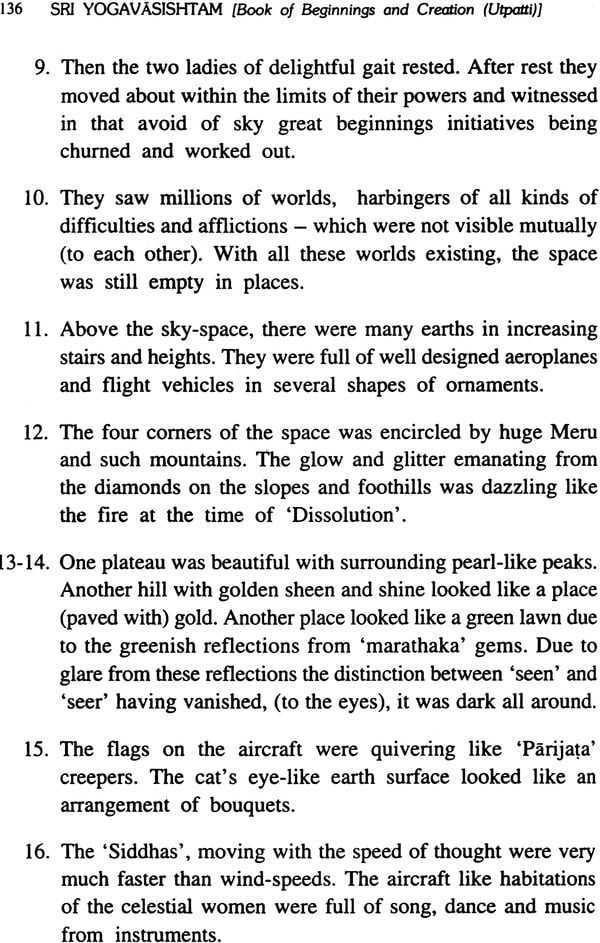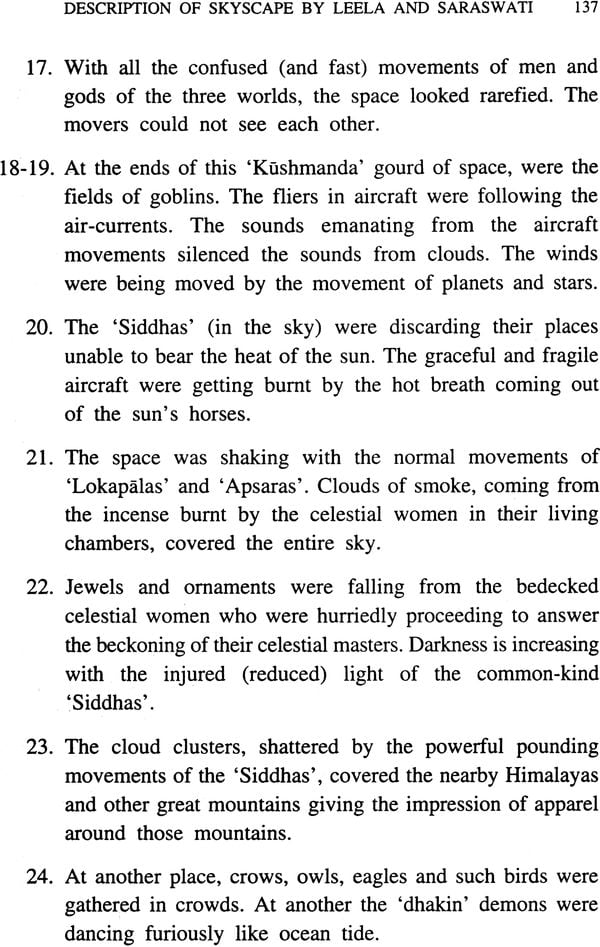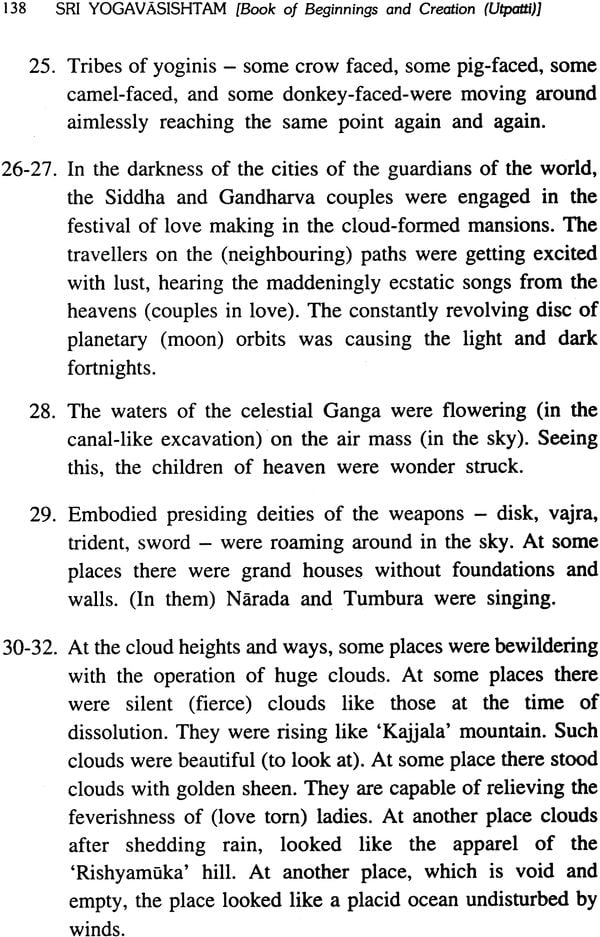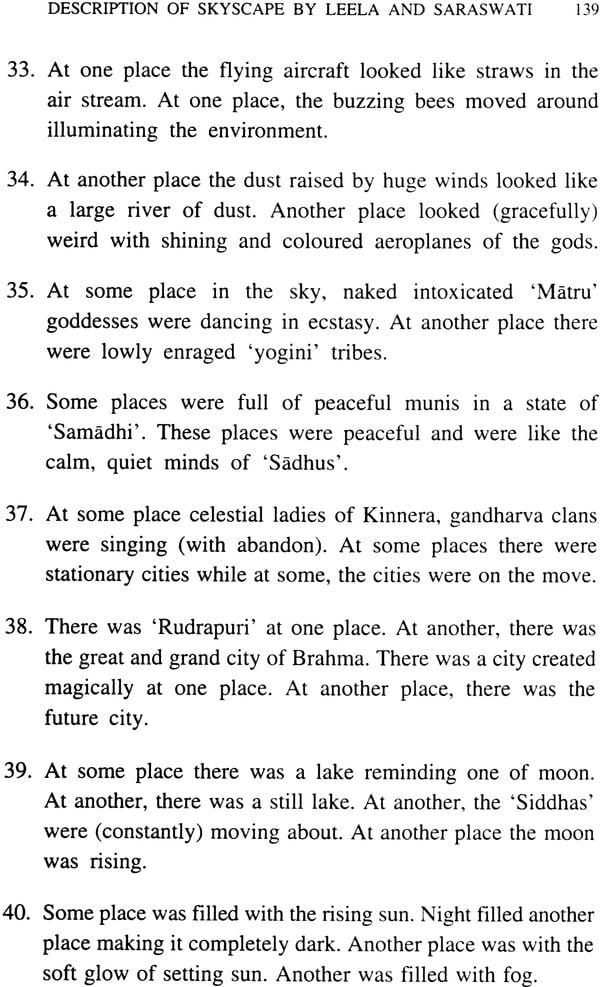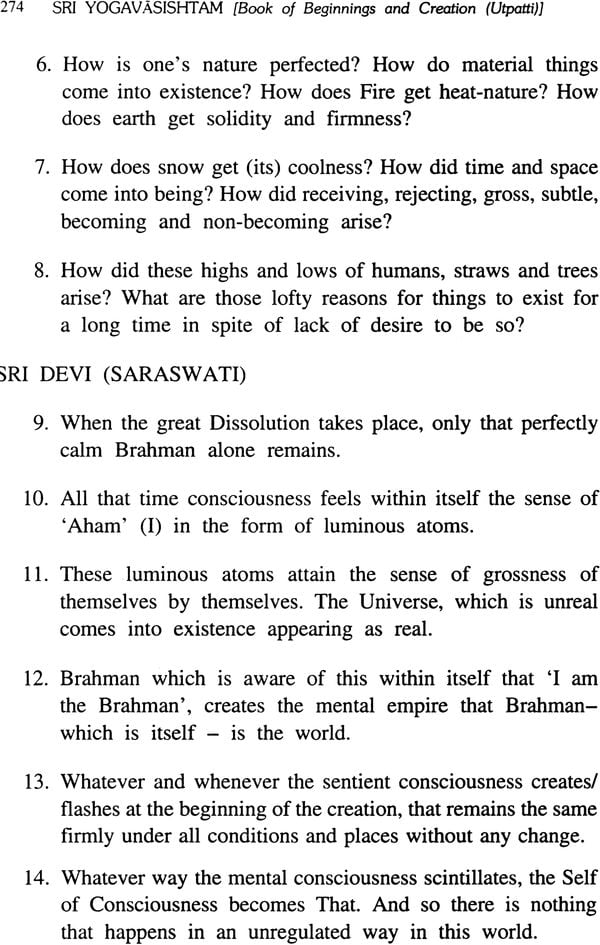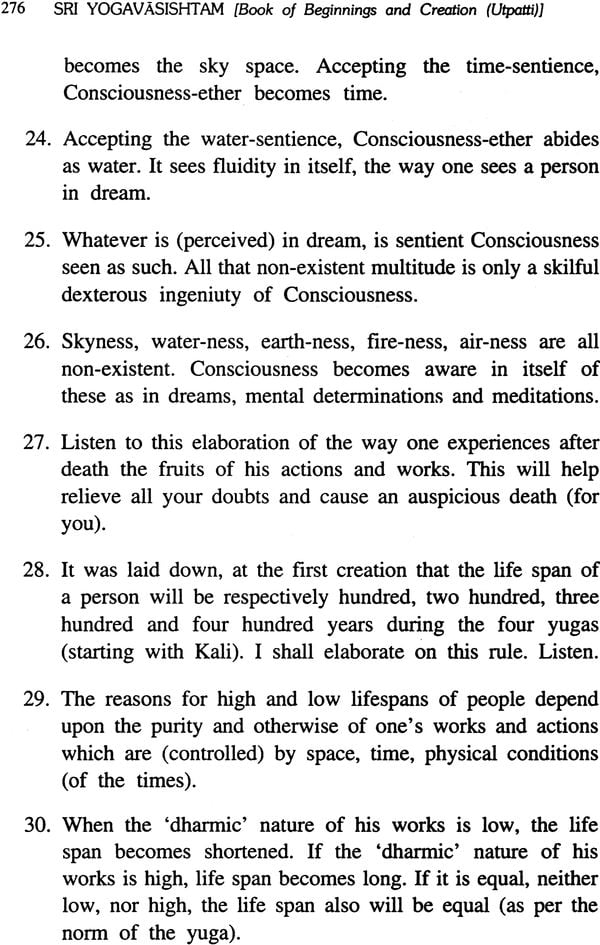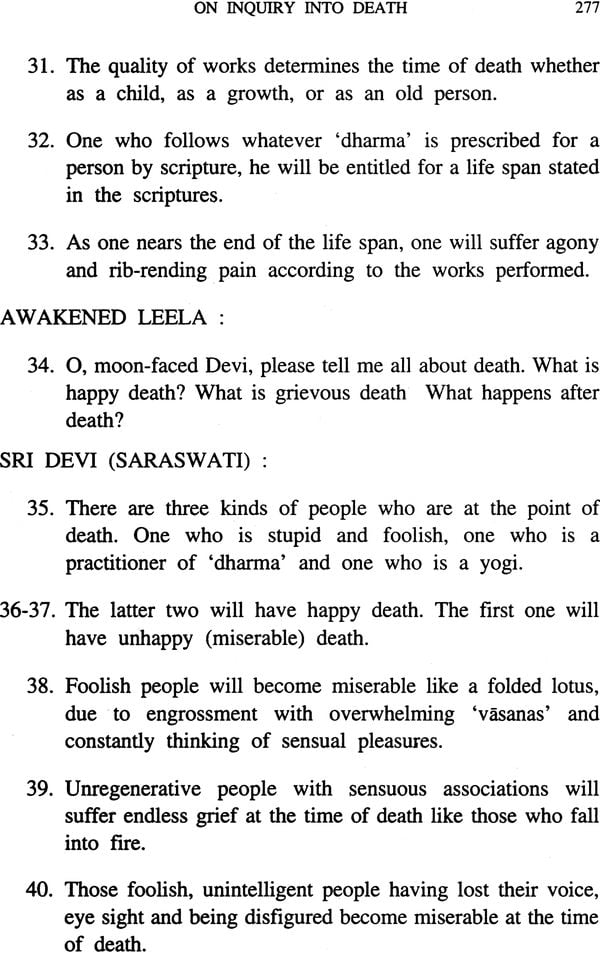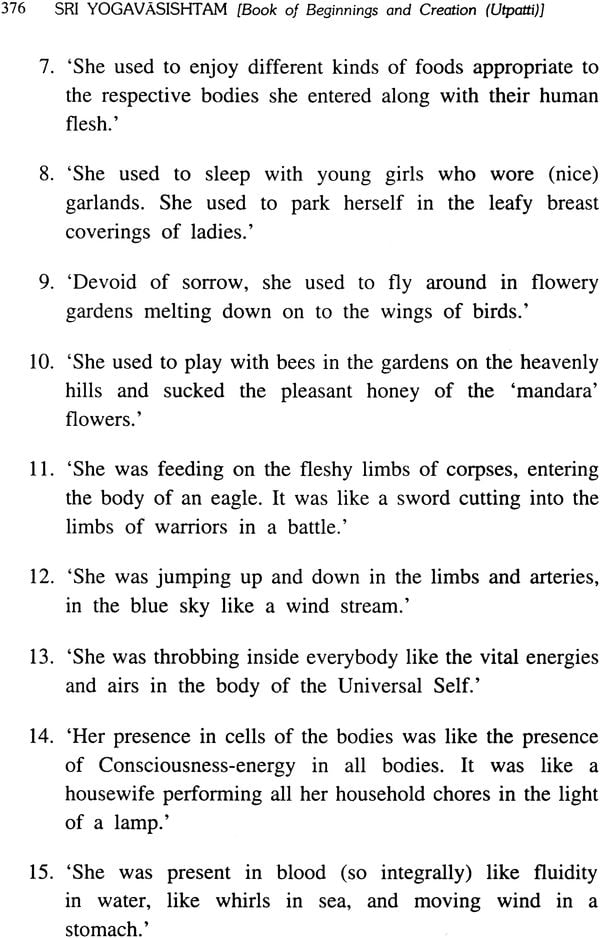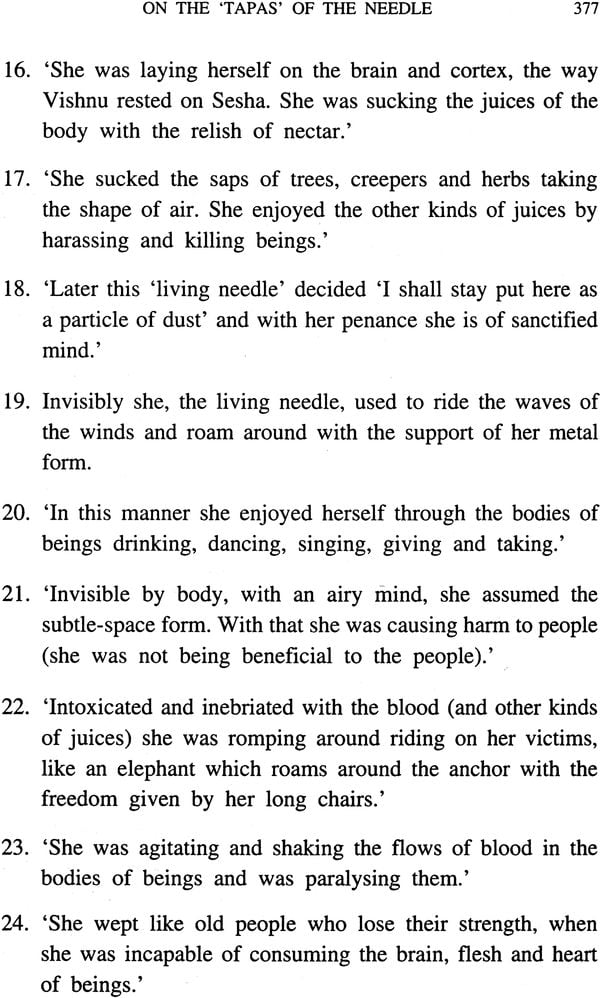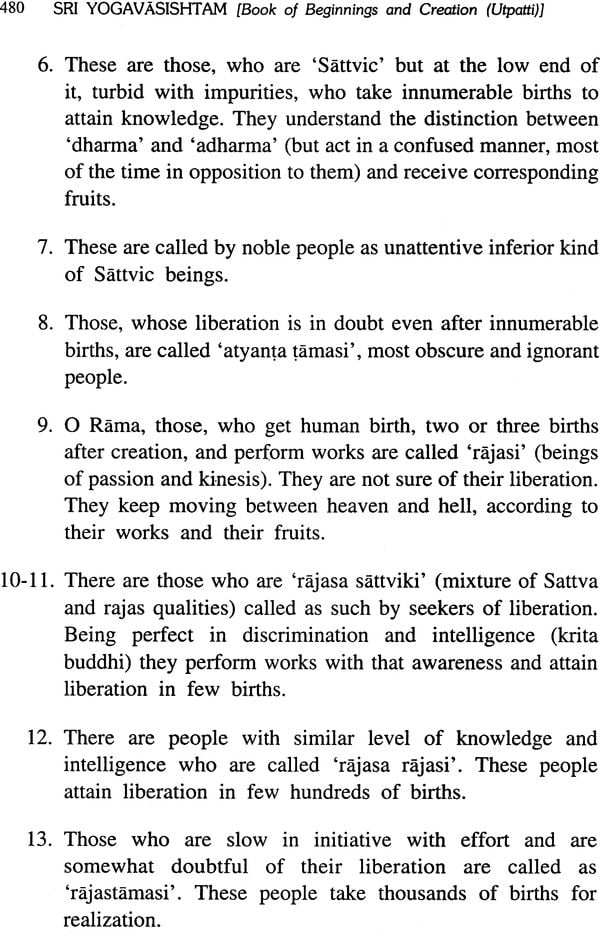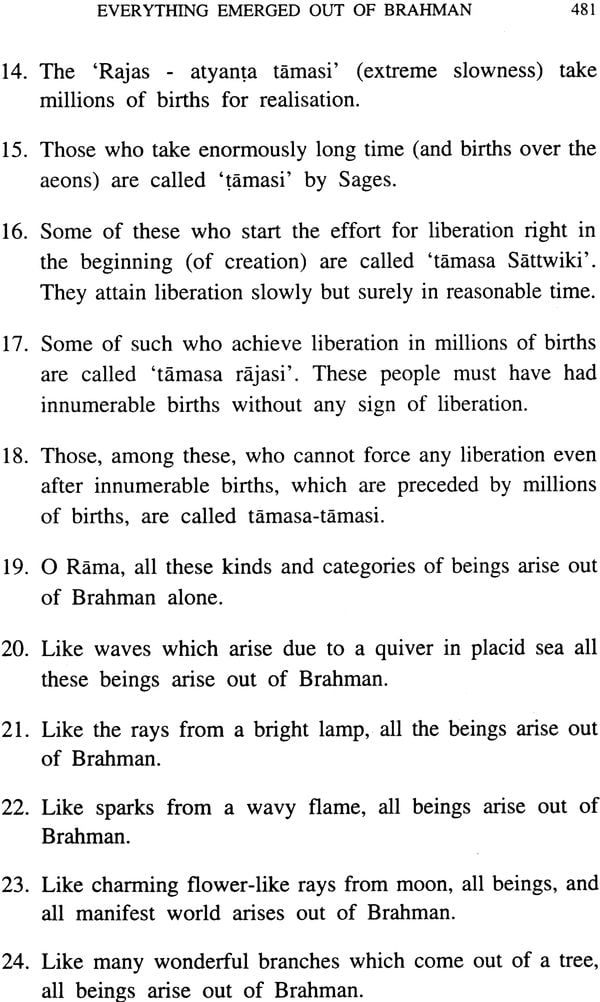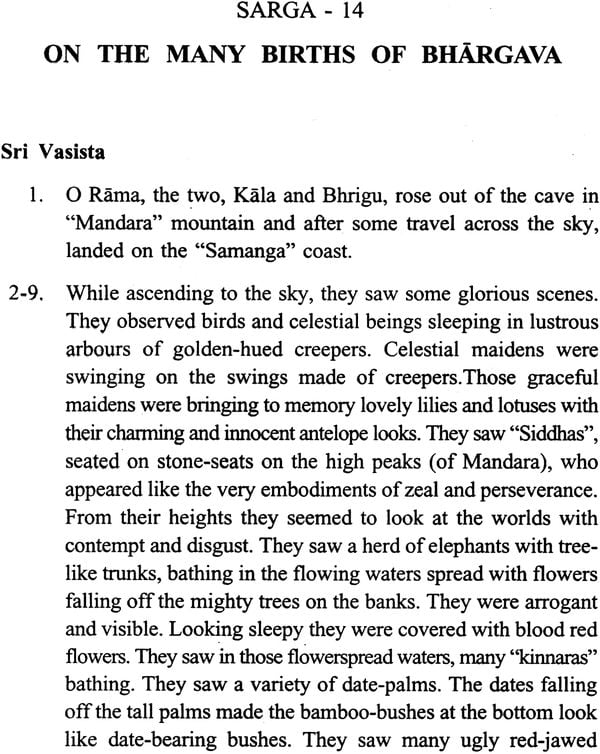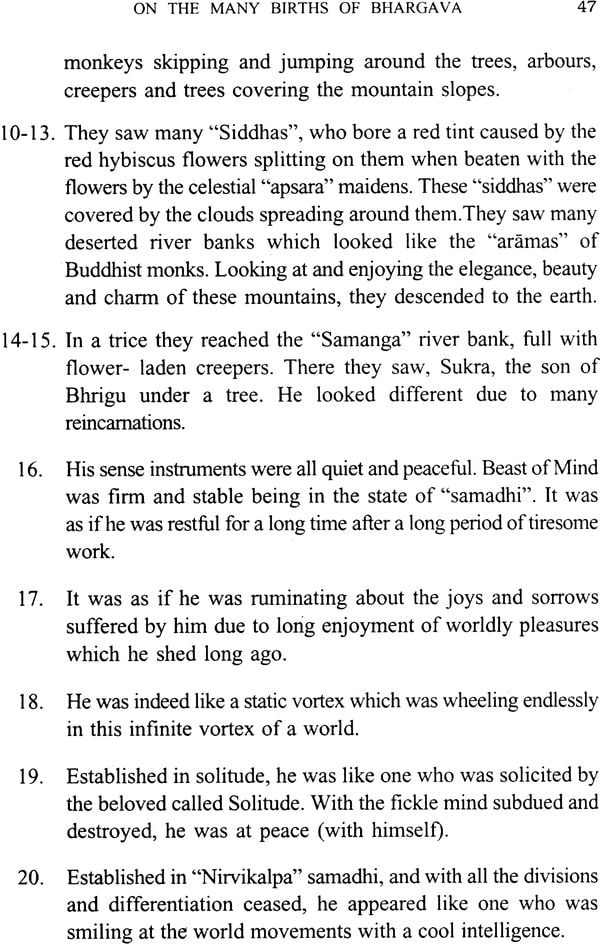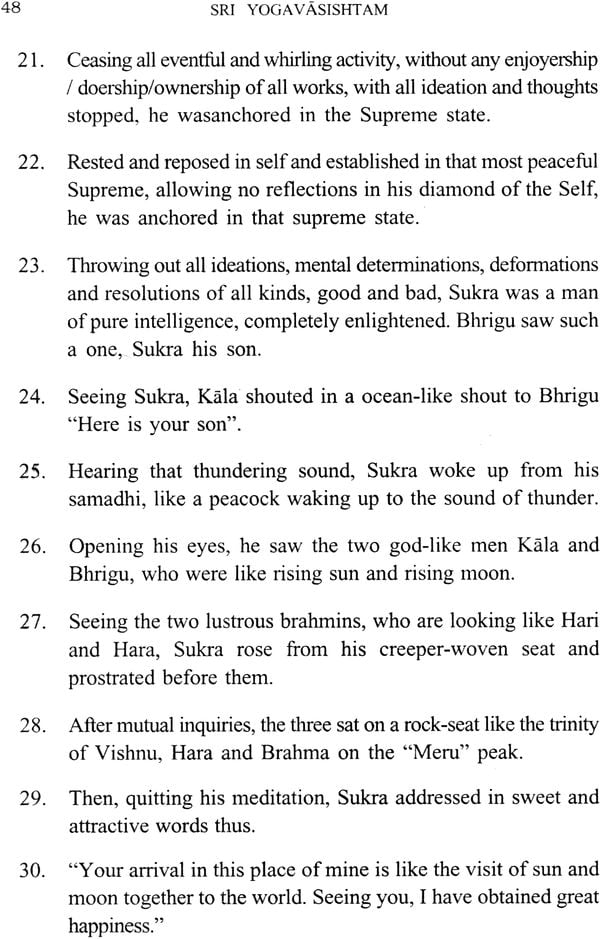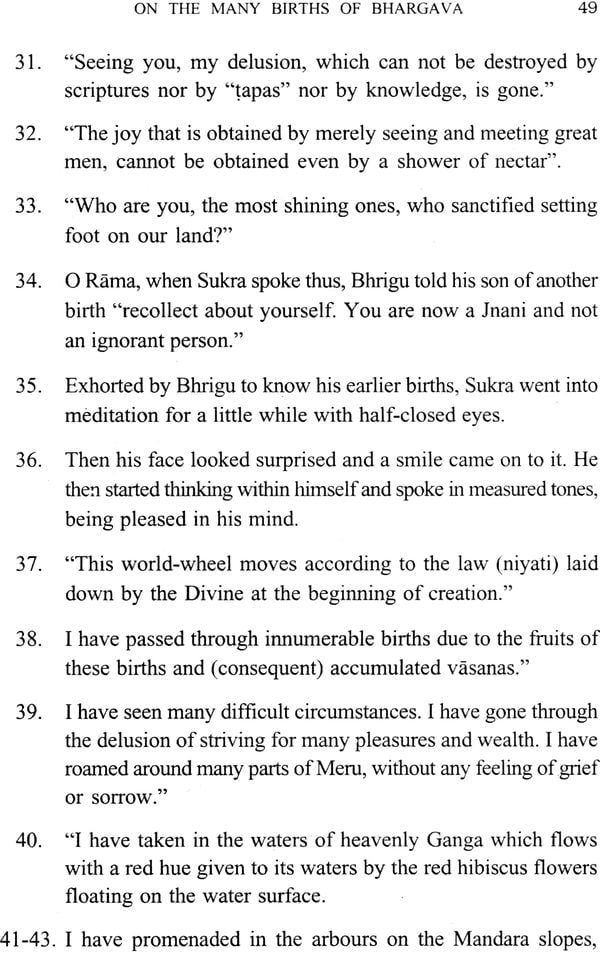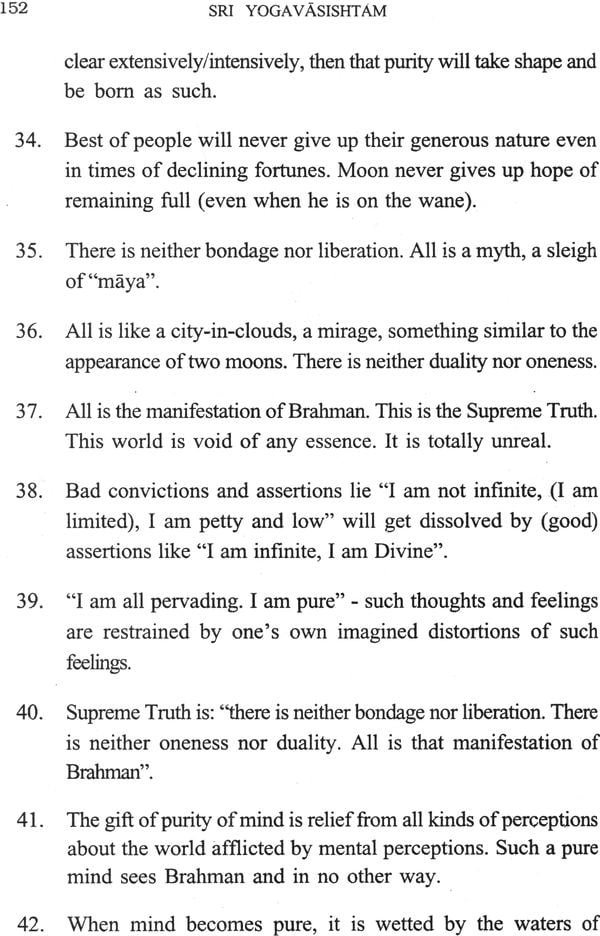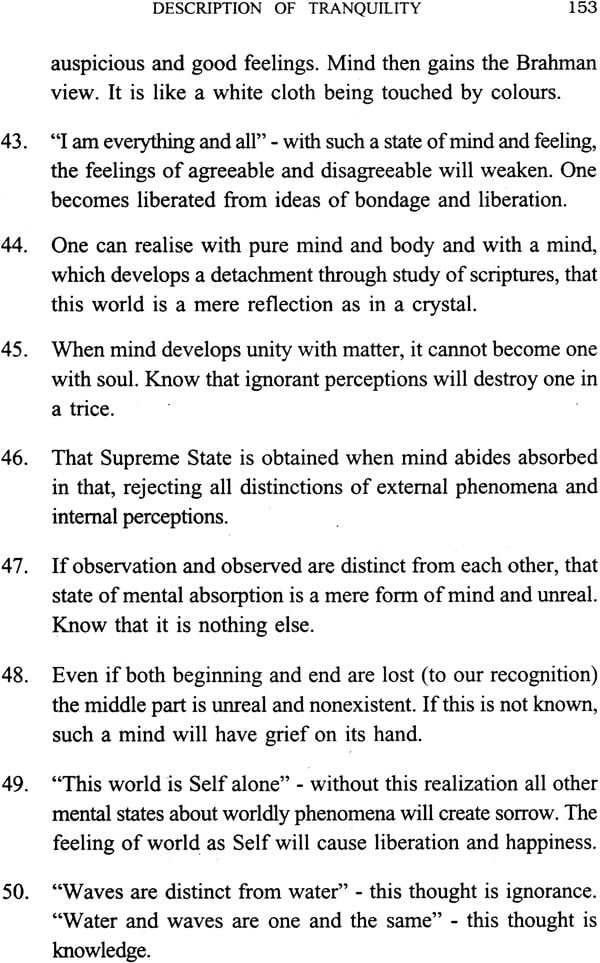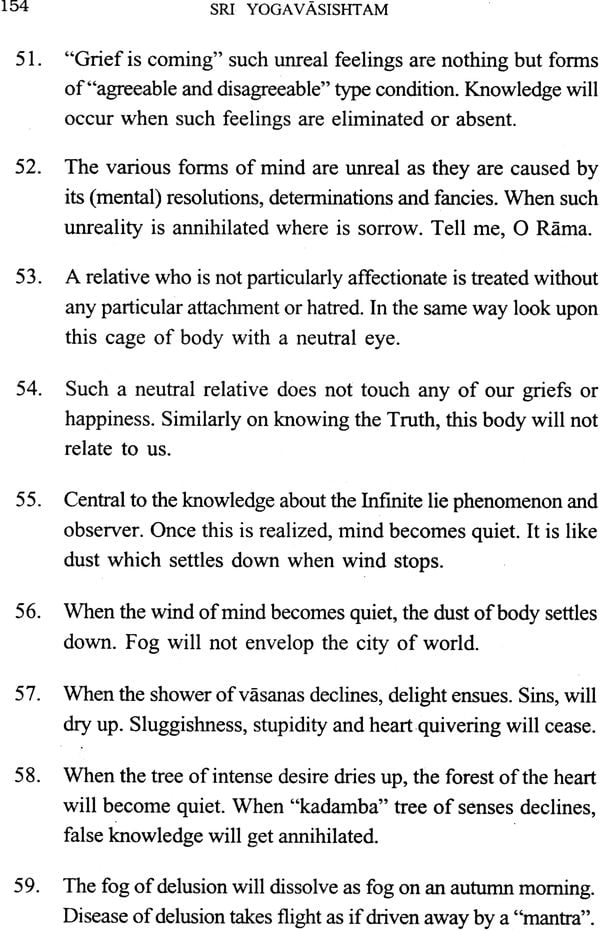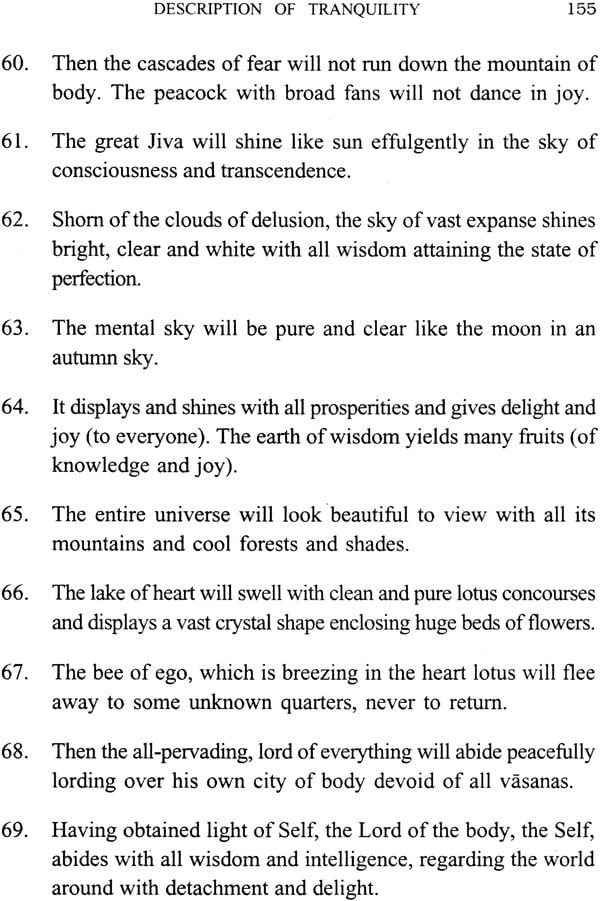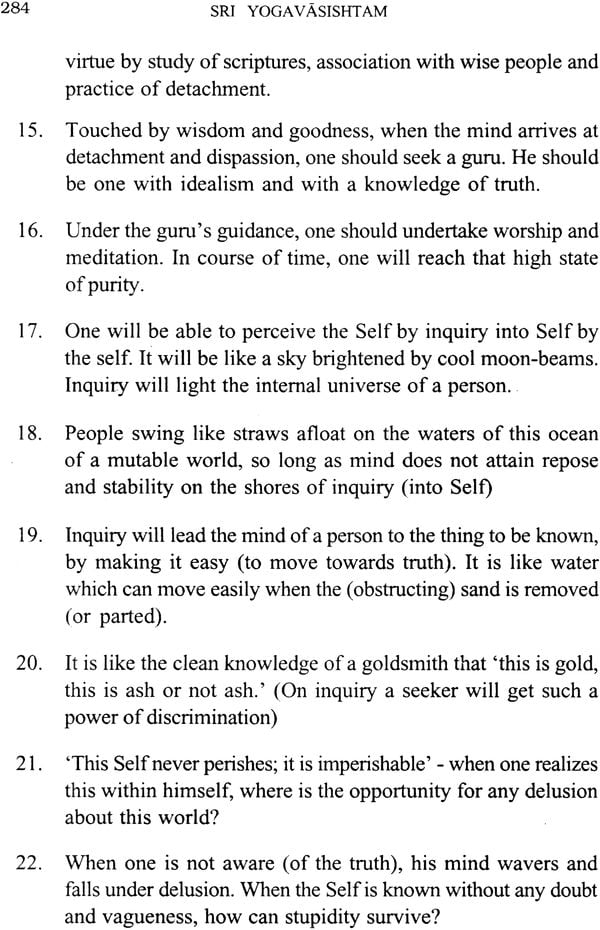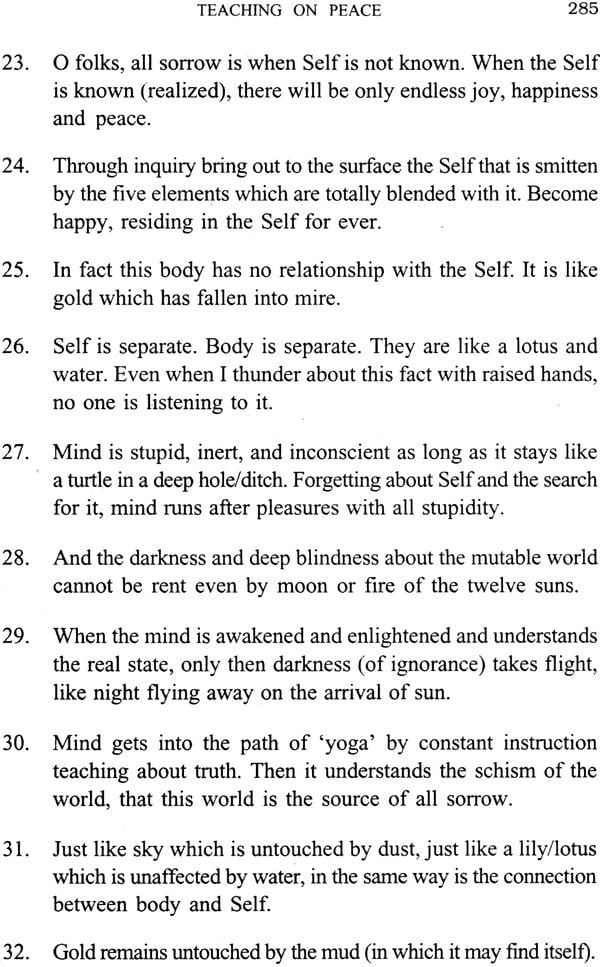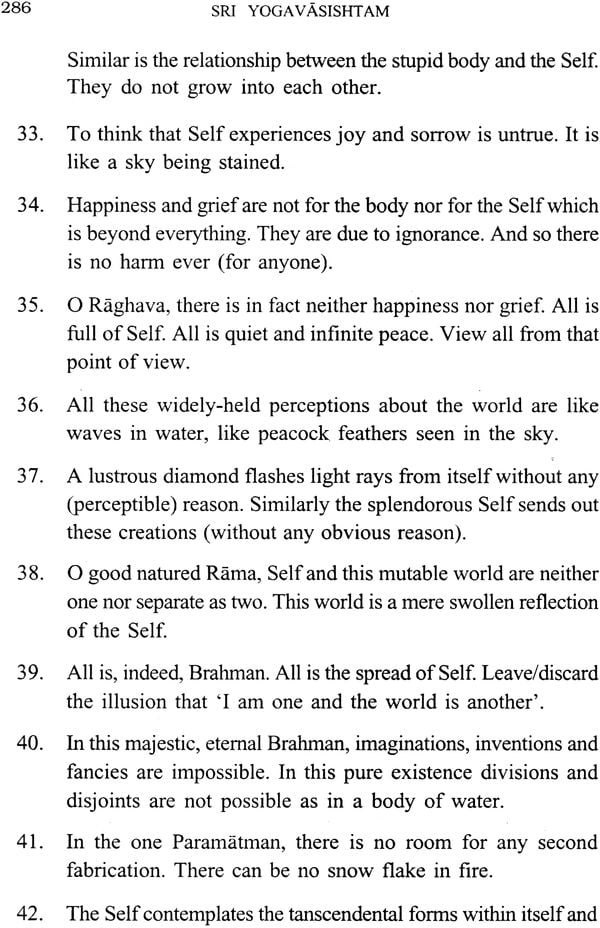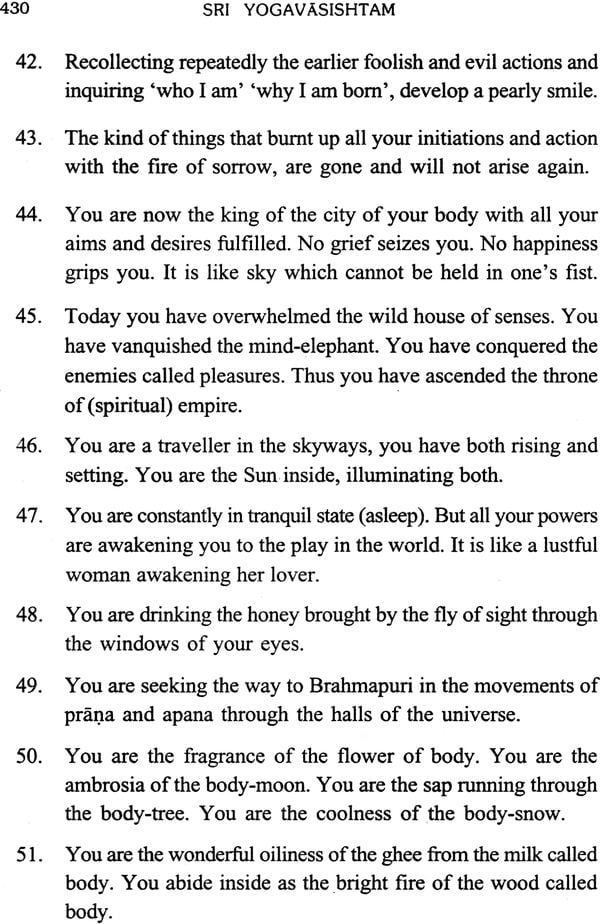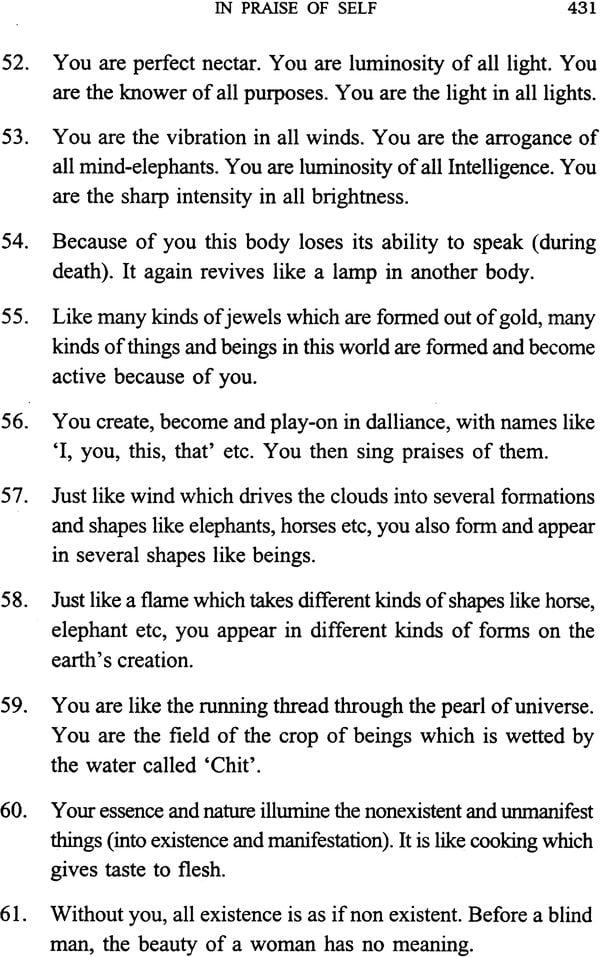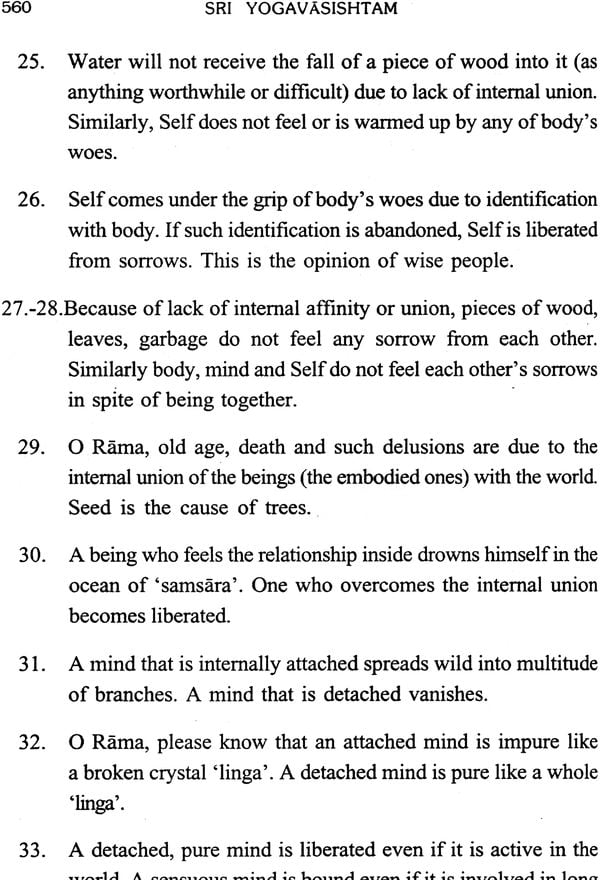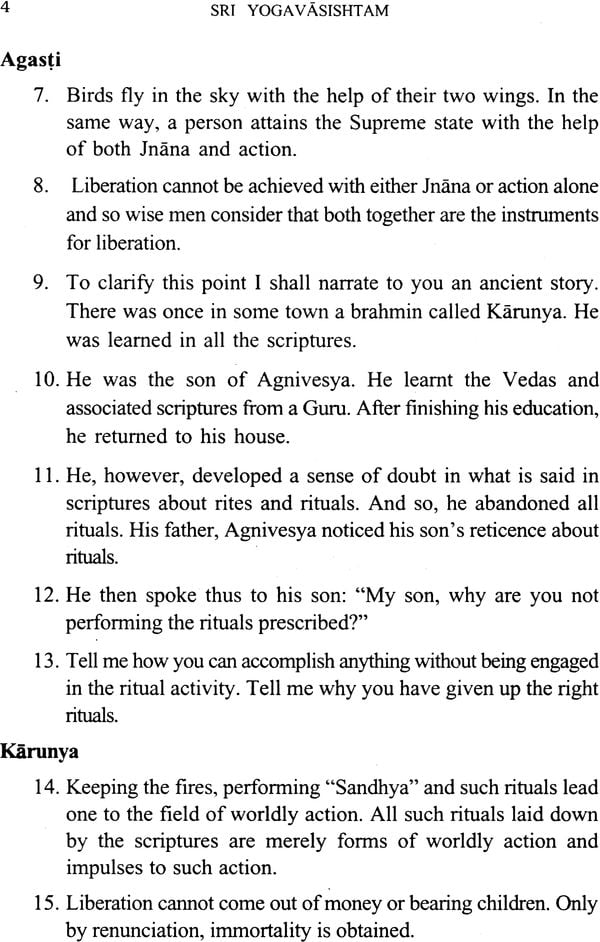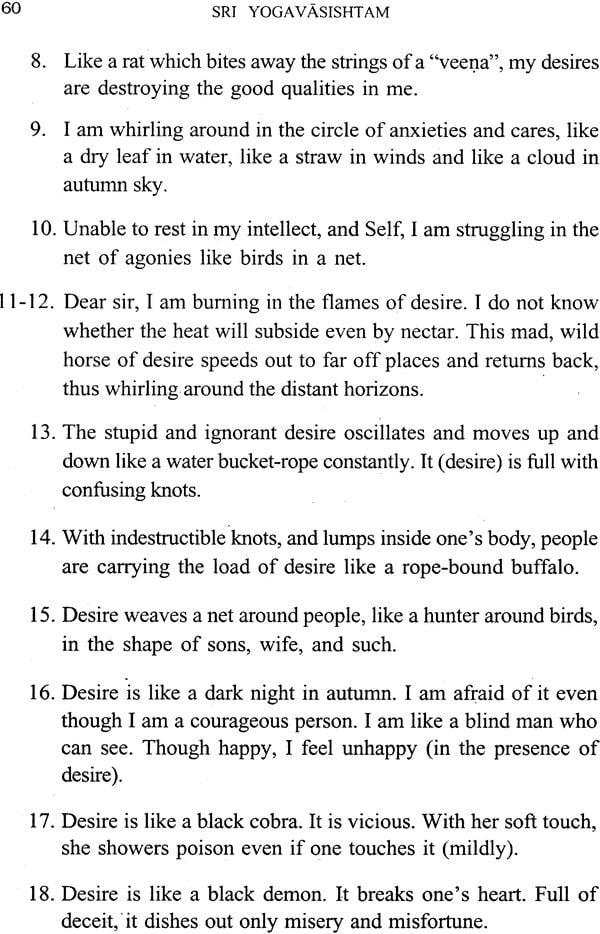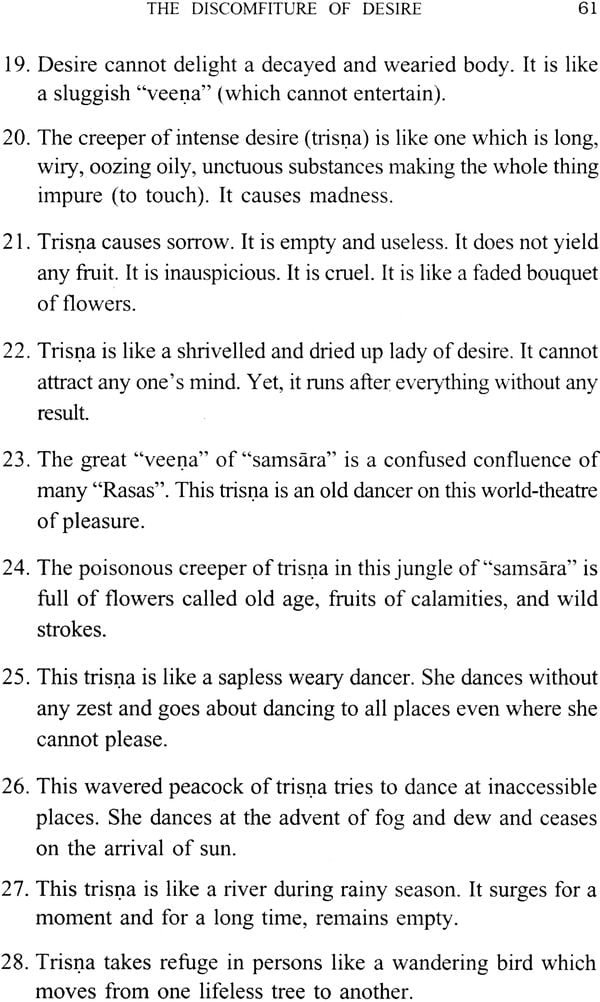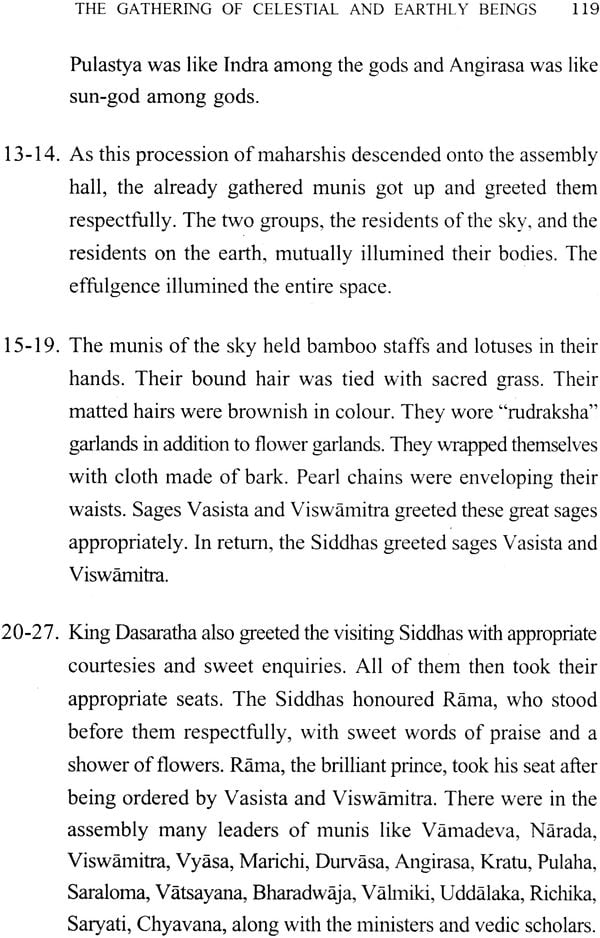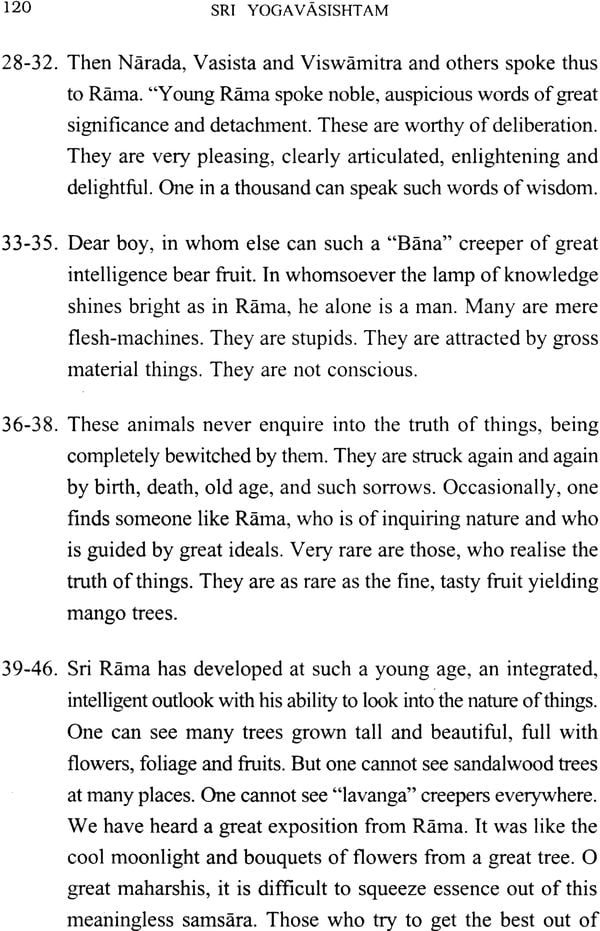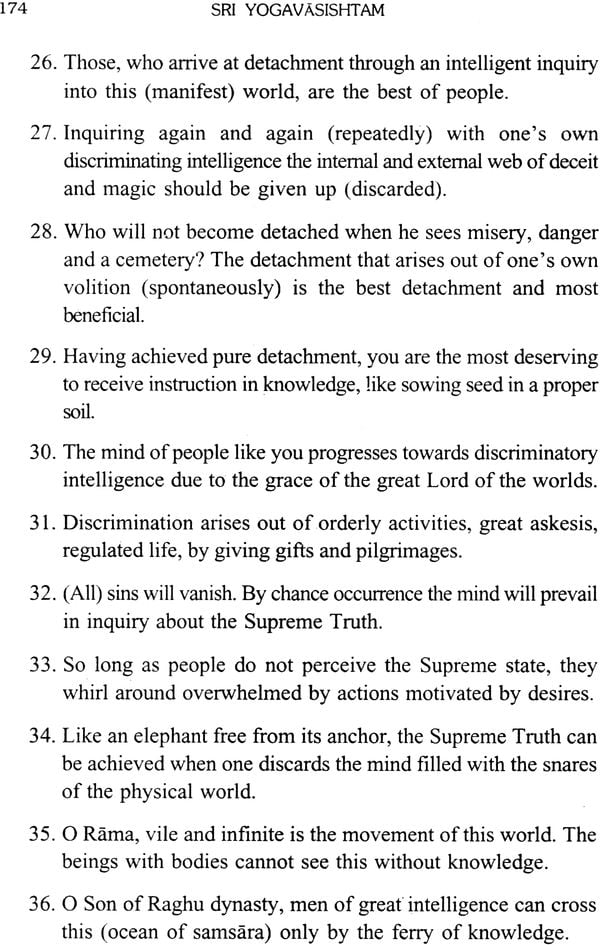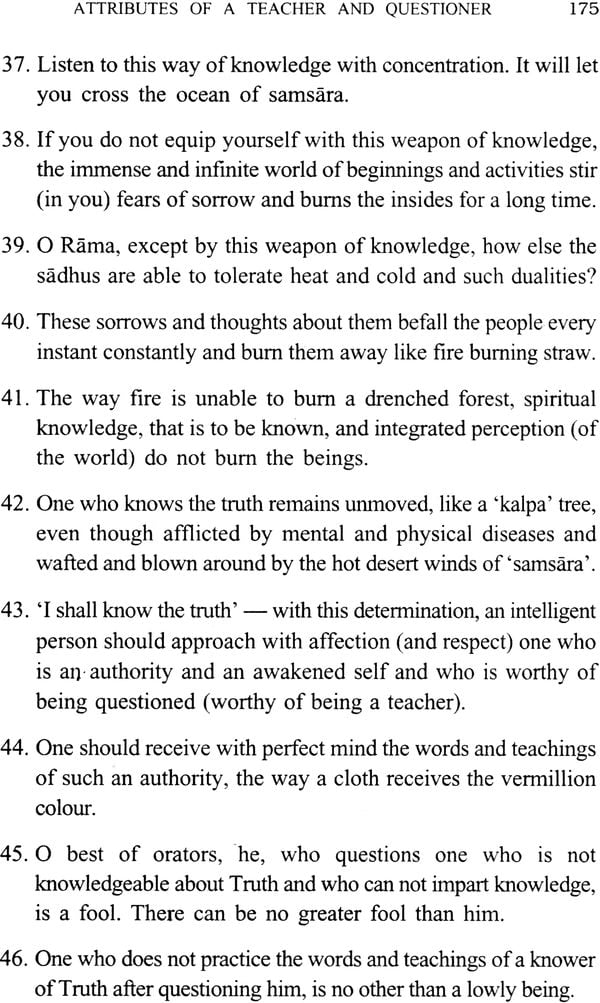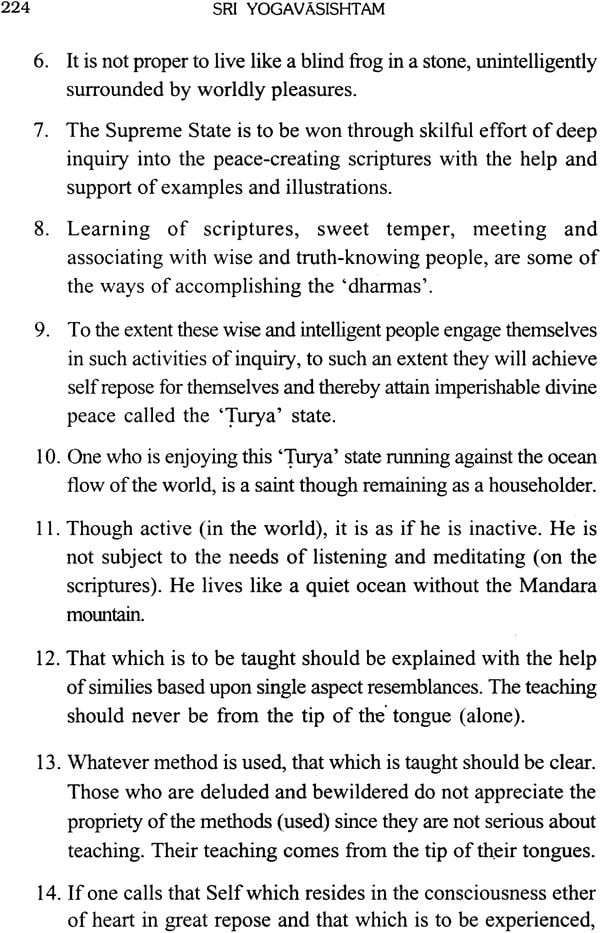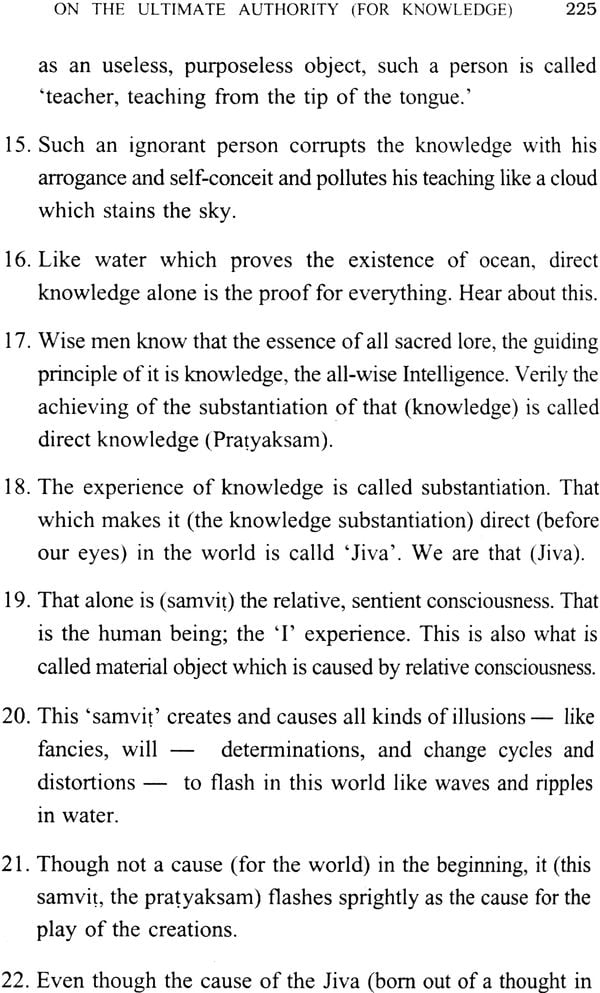
Sri Yoga Vasishta (Maharamayanam): Set of 5 Volumes - English Translation Only (An Old and Rare Book)
Book Specification
| Item Code: | NAF331 |
| Author: | P. N. Murthy |
| Publisher: | Bharatiya Vidya Bhavan |
| Language: | English |
| Edition: | 2001 |
| Pages: | 3431 |
| Cover: | Paperback |
| Other Details | 8.5 Inch x 5.5 Inch |
| Weight | 2.44 kg |
Book Description
1. Book of Nirvana (Part I)
2. Book of Nirvana (Part II)
3. Book of Beginnings and Creation (Utapatti) (Book II)
4. Book of Being and Becoming and Book of Tranquility and Repose
5. Book of Dejection and Book of Seeker
Born in 1928, Prof. P.N. Murthy graduated in Machanical Engineering from Annamalai University in 1949 and later pursued aeronautical engineering at Indian Institute of Science and University of Iillnois, Urbans, USA. He obtained Ph. D. in Aeronautics and Astronautics at University of Illinois in 1962. He taught Aeronautical Engineering in IISC Bangalore and IIT Kanpur. He was the head of the department of Aeronautical Engineering in IIT Kanpur during its formative years. In 1982 he moved to Tata Consultancy services to start a research centre in systems engineering and Cybernetics at Hyderabad. He was the head of the centre till 1996 when he relinquished the Job to become Advisor, Tata Consultancy Services. During his Long career he published nearly 100 technical papers in various journals covering aeronautical subject and complex societal problems. During his tenure at TCS he developed a method called ‘Multimodelling’ (now called DIKSUCHI’) to help resolve complex societal problems. At presents he is involved in promoting Adult Literacy through a computer based method called CBFL. He is one of the principle initiators of his program.
As a student activist he participated in the 1942 Quit India Movements. He participated in the progressive literature movements and authored several short stories, philosophical essays and one act plays in Telugu. One of his novels ‘GALI BUDAGALU’ in Telugu has been reissued in 2004, after forty years.
He received the millennium award of American Biographical Society in 2000.
He is a member of several professional bodies and participated in several national and international conferences. He is one of the founder-directors of Engineering staff college of India, a unique continuing education center of practioners of profession people.
He is nominated by the Combridge Biographical Society as one of the top 100 Engineers of 2008. He is the member of the Governing Council of SEED and ReD, NGO.
Viswamitra, the great sage of many spiritual attainments and achievements, comes to the court of Dasaratha, King of Ayodhya, to request for the help of his son Prince Rama for protection his sacrificial site from the ravaging onslaughts of the Rakshasas (demons). Dasaratha, the aged king, was initially hesitant to send Rama to the battlefield. He pleads with Viswamitra Rama only sixteen years now. He does not have the experience of a battle, and least of all, with the ferocious Rakshasas. I shall come instead with all my armies. Viswamitra concedes that Dasaratha is an experienced battle scarred warrior of significant successes. Even so he cannot replace Rama who, though young, is highly skilled in warfare. He requests sage Vasishta. The Guru of Raghu clan, the dynasty of Dasaratha and Rama, to intervene on his behalf. Sage vasishta explains to Dasaratha that Rama is no ordinary person and suggests that he accedes to the request of Sage Viswamitra. Unable to counter Vasishta, since the word of a Guru is like command, Dasaratha agrees to send Rama and tells Rama to accompany Sage Viswamitra. But Rama was averse to undertake the expedition even though he is a dutiful son. He has just returned from a pilgrimage to various holy places of India and the result of the tour was a conviction that there is very little to commend the pursuing of activity in an ephemeral world. Thus starts the famous dialogue between sage Vasishta and Rama. This dialogue was recorded by Sage Valmiki as Vasishta Maharamayana. The span and spread of this dialogue is voluminous sunning into 32000 slokas (couptets) in Sanskrit divided into six books:
I. Book of despair and dejection of Rama.
II. Book of nature and behaviour of a seeker.
III. Book of Creation.
IV. Book of being and becoming.
V. Book of Tranquillity and Repose.
VI. Book of Nirvana.
Of the 32000 slokas, nearly 16000 constitute of books of Nirvana. And it is also like a summary of all that has to be conveyed by Vasista to Rama.
Yogavasishtam is one of the important texts of Indian spiritual tradition. It expounds almost all strands of spiritual experience and thoughts that span the wide range of the tradition. It is one of the thoughts that span the wide range of the tradition. It is one of the most ancient expositions containing many important thought patterns of even the famous Bhagavad Gita. In Yogavasishtam, the story of Arjuna and the ‘Yoga of disinterest and detachment’ correspond to the Bhagavad Gita.
The text of Yogavasishtam represents the typical dialogue between a teacher and a student in great detail. The exposition extents to over nearly twenty days, almost every day from sunrise to sunset. The audience consisted of a wide range of people starting from common people with simple interest to learned sages and gods. The setting seems to be in the vast palace gardens in a recess of cleared ground flanked by huge tall trees with crowns of dense foliage with the sky as canopy. This may be the reason why Vasishta draws heavily from the analogy of tree cloud apart from the idea of mirage. The exposition is such that all propositions and hypotheses are explained in great detail with illustrative stories and logical elaborations. Yogavasishtam contains its own annotations and commentary and hence the enormous length.
This attempt at translation of this great work is at the instance of my Guru, Sri Shiva Balayogi Maharaja. Several years ago, in a rare moment of communion and compassion, he suggested ‘why don’t you translate Yogavasishtam into English. There is no unabridged version of it in English. You know Telugu, English and some Sanskrit. Initial reaction of mine was a shudder ‘Do you really mean it, Swamiji? Where am I and where is that great book?
You mean you need inspiration and support. Don’t worry. I am there’.
For years I could not pick up the necessary courage even though Swamiji gave me the unabridged Telugu translation of Yogavasishtam, unning into four volumes and nearly 5000 pages. The Telugu translation was done by Swami Purnananda and Swami Vidyaprakasanandagiri of Vyasa Ashram, Erpedu, Chittoor District, Andhra Pradesh, India.
I read these volumes twice from cover to cover. The magnitude of the task was staggering. However, recently my Guru conveyed to me to the task was staggering. However, recently my Guru conveyed to me his blessings and encouragement a year ago. I started the translation. The inspiration was, therefore, always flowing through the pen. I am presenting this to the public. I expect to finish the stupendous task in about two years with his Grace. Failed Some times. Even so, I hope the translation did not suffer much.
There is another angle to it. We all believe that Swamiji was Vasishta and what is in Yogavasishtam is what he said. He is speaking again to the world.
Book of Dejection and Book of Seeker
| Preface | V | |
| Preface to book of Beginnings | IX | |
| Acknowledgements | XI | |
| Publisher's Note | XIII | |
| Book of Dejection | ||
| Sarga | ||
| 1 | Prelude-1 | 3 |
| 2 | Prelude-2 | 10 |
| 3 | Pilrimage of Sri Rama | 13 |
| 4 | The Daily Routine of Sri Rama | 16 |
| 5 | Making known the Thinning Down (of Rama) | 18 |
| 6 | The Arrival of Viswamitra | 20 |
| 7 | The Request of Viswamitra | 24 |
| 8 | Reply of Dasaratha | 27 |
| 9 | Consoling by Vasista | 31 |
| 10 | The Distress of rama | 34 |
| 11 | Consoling by Rama | 39 |
| 12 | Grief of Rama | 43 |
| 13 | (Rama's) contempt for wealth | 46 |
| 14 | (Rama's) Contempt for life | 49 |
| 15 | (Rama's) Abhorence for Egotism and self-Conceit | 52 |
| 16 | The Wickedness of Mind | 55 |
| 17 | The Discomfiture of Desire | 59 |
| 18 | (Rama's) Abhorence for the body | 65 |
| 19 | (Rama's) Censure of childhood | 71 |
| 20 | (Rama's) contempt for youth | 74 |
| 21 | (Rama's) dislike for women | 78 |
| 22 | (Rama's) censure of old age | 82 |
| 23 | The calamity of time | 86 |
| 24 | The Dalliance of Time | 90 |
| 25 | The Dalliance of Lord of Death | 91 |
| 26 | The Desicable Pastime of Gods | 94 |
| 27 | On the Transience of hostility towards beatitude and salvation | 99 |
| 28 | On the Incessant perversity of all aspects of Life | 104 |
| 29 | On the Perishablitiy of everthing | 108 |
| 30 | Rama's Prayer for a teaching | 110 |
| 31 | On the queries of Rama | 113 |
| 32 | On the Praise by Celestial beings | 116 |
| 33 | The gathering of celestial and eathly beings | 118 |
| Book of Seeker | ||
| 1 | The Nirvana of suka | 125 |
| 2 | Viswamitra's request | 130 |
| 3 | On cycles of creation | 134 |
| 4 | On personal effort | 139 |
| 5 | Firm Assertion of Personal effort | 142 |
| 6 | On Repudiation of Fate | 147 |
| 7 | Reiteration of personal effort | 153 |
| 8 | Repudiation of Fate | 157 |
| 9 | Inquiry into Personal Action | 161 |
| 10 | The Descent o Spiritual Knowledge | 166 |
| 11 | Attributes of a teacher and questioner | 171 |
| 12 | On the Greatness and Majesty of Truth | 179 |
| 13 | On Peace and Quietude | 183 |
| 14 | On Inquiry into truth | 193 |
| 15 | On Contenment and Joy | 200 |
| 16 | On Principled conduct of life | 203 |
| 17 | On the Various Books of Yoga Vasistam | 207 |
| 18 | On the Value of Examples and Illustrations | 214 |
| 19 | On the Ultimate Authority (For Knowledge) | 223 |
| 20 | On the Right Conduct of Life | 228 |
Book of Nirvana (Part I)
| Publisher's Note | V | |
| Preface | IX | |
| Acknowledgements | XIII | |
| 1 | Description of the day's routine | 1 |
| 2 | The concept of repose | 2 |
| 3 | On oneness with Brahman | 7 |
| 4 | On annihilation of mind | 9 |
| 5 | The Description of Rama's repose | 10 |
| 6 | The majestic power of delusion | 12 |
| 7 | The Great Power of ignorance | 16 |
| 8 | Teaching on the Charm of the creeper of Ignorance | 21 |
| 9 | The Repudiation of Ignorance | 24 |
| 10 | Healing of Ignorance | 26 |
| 11 | On the yoga of liberation while in the life | 31 |
| 12 | Resolving the doubts about the liberated while in life | 39 |
| 13 | On the yoga of inquiry through knowledge | 42 |
| Story of Bhushunda | ||
| 14 | The Glory of the peak of meru | 43 |
| 15 | Seeing Bhushunda | 45 |
| 16 | The meeting of vasishta and Bhushunda | 45 |
| 17 | Description of the person of Bhushunda | 47 |
| 18 | Description of the activities of the mothers | 48 |
| 19 | Acquisition of an abode | 51 |
| 20 | Understanding the real nature of Bhushunda | 54 |
| 21 | The story of his long life | 57 |
| 22 | Description of his long life | 62 |
| 23 | On spurning the desire for tranquil attention | 66 |
| 24 | Inquiry about prana | 69 |
| 25 | Description of Samadhi | 73 |
| 26 | The causes of long life | 79 |
| 27 | End of the story of Bhushunda | 83 |
| 28 | Yoga of the supreme Purpose | 84 |
| 29 | Description of the Immanence of the supreme self in the word | 92 |
| The Story of the worship of Siva | ||
| 30 | Inquiry into the consiousness Devoling towards the World of Activity | 103 |
| 31 | The Oneness of mind and prana | 112 |
| 32 | The Journey of the body | 117 |
| 33 | The delusion of one as many | 122 |
| 34 | The Teaching of the supreme Lord | 126 |
| 35 | The Greaatness of Mahadeva | 129 |
| 36 | The Glory of the supreme Lord | 132 |
| 37 | The Dance of the Law | 134 |
| 38 | External worship | 137 |
| 39 | The method of God-Worship | 140 |
| 40 | The Nature of Gods | 146 |
| 41 | The illusory nature of the world | 148 |
| 42 | One called the surpreme self | 153 |
| 43 | The Glory of repose and Tranquility | 157 |
| 44 | The ascendance of mind | 160 |
| 45 | The Story of Bilwa tree | 163 |
| 46 | On the inside of a stone | 167 |
| 47 | The majesty of consciouness | 170 |
| 48 | The oneness of Brahaman and self | 174 |
| 49 | The yoga of inquiry into the flux of the world | 176 |
| 50 | The Yoga of discrimination between images | 180 |
| 51 | Inquiry into the Sense Objects | 184 |
| The Story of Arjuna | ||
| 52 | The story of Avatars of nara and Narayana | 191 |
| 53 | Advice and Teaching to Arjun | 194 |
| 54 | Initiation into self knowledge | 200 |
| 55 | On Jivahood | 204 |
| 56 | On the Mind | 208 |
| 57 | The repose of Arjuna | 212 |
| 58 | Fulfillment of Arjuna | 213 |
| 59 | Realization of Self | 215 |
| 60 | Yoga of Power and personalities | 220 |
| 62 | The Story of world as a Dream | 222 |
| The Story of Jivata | ||
| 62 | The world of the begger and the hundred Rudras in dream | 225 |
| 63 | The story of hundres Rudras in Dream | 229 |
| 64 | The story of attaining Gunahood | 236 |
| 65 | Dismay over the knowledge | 239 |
| 66 | The changing world of the mendicant | 241 |
| 67 | On oneness with Brahman | 244 |
| 68 | On striving for the great silences | 248 |
| 69 | On the Union of mind and Prana | 251 |
| 70 | The questions of betala | 257 |
| 71 | On the answer to the first question of betala | 259 |
| 72 | On the demolition of betala's Questions | 261 |
| 73 | End of Betala Story | 262 |
| 74 | Instruction to Bhagiratha | 263 |
| 75 | Nirvana of Bhagiratha | 267 |
| 76 | The Desent of Ganga | 269 |
| The Story of Choodala | ||
| 77 | The Dalliance of Sikhidhwaja | 271 |
| 78 | The Enlightenement of Choodala | 275 |
| 79 | The Attainment of Self by Choodala | 280 |
| 80 | The play of the five subtle elements | 283 |
| 81 | On (Mystic)Fire and Moon | 291 |
| 82 | On the yoga of the gaining of Siddhis | 303 |
| 83 | The story of kirata | 306 |
| 84 | The Mendicancy of Sikhidhwaja | 309 |
| 85 | On the Yoga of Inquiry into happiness | 314 |
| 86 | The Birth of Kambha | 326 |
| 87 | The enlightenment of Sikhidhwaja | 328 |
| 88 | The story of manikach | 333 |
| 89 | The story of the mahout | 335 |
| 90 | On accomplishment of the wish Giving dimaond | 338 |
| 91 | The meaning of the story of the Mahout | 341 |
| 92 | Giving up everything | 343 |
| 93 | The enlightenment of Sikhidhwaja | 347 |
| 94 | The enlightenment of Sikhidhwaja | 353 |
| 95 | On the tranquility and repose of Sikhidhwaja | 360 |
| 96 | On the enlightment of sikhidhwaja | 363 |
| 97 | The enlightenment of Sikhidhwaja | 368 |
| 98 | The enlightenment of Sikhidhwaja | 370 |
| 99 | The enlightenment of Sikhidhwaja | 373 |
| 100 | The supreme bliss of Sikhidhwaja | 376 |
| 101 | Exhortation to Sikhidhwaja | 379 |
| 102 | The Tranquility of Sikhidhwaja | 385 |
| 103 | The return of Kumbha | 387 |
| 104 | On the Behaviour of the one Liberated While in Life | 392 |
| 105 | Kumbha becoming a woman | 396 |
| 106 | The Marriage of Leela | 401 |
| 107 | The arrival of Indra | 406 |
| 108 | The seeing of the real form of Choodala | 408 |
| 109 | The manifestation of choodala | 412 |
| 110 | Nirvana of Sikhidhawaja | 418 |
| 111 | Exhortation of Kacha | 421 |
| 112 | Preserving sky in the story of the mythical person | 425 |
| 113 | The story of the Mythical being | 428 |
| 114 | On the Supreme Purpose | 430 |
| 115 | On the three vows | 433 |
| 116 | On the Characteristics of Slippery Mind | 437 |
| 117 | The Dialogue between ikshvaku and manu | 439 |
| 118 | The Dialogue between ikshvaku and manu | 440 |
| 119 | The Dialogue between ikshvaku and manu | 442 |
| 120 | The Seven 'Bhumikas' (bases) | 444 |
| 121 | The Dialogue between ikshvaku and manu | 446 |
| 122 | The Exhoration of Ikshvaku | 448 |
| 123 | The distinction between the knower of Truth and the ignorant | 450 |
| 124 | The Story of the Hunter | 451 |
| 125 | On the steadiness in the Turya state | 454 |
| 126 | On the nature of the supreme Purpose | 456 |
| 127 | The commandments to Bharadwaja | 465 |
| 128 | The waking up of Rama | 471 |
| Preface | V | |
| Preface to book of Beginnings | IX | |
| Acknowledgements | XI | |
| Publisher's Note | XIII | |
| Book of Stithi | ||
| Sarga | ||
| 1 | On the refutation of birth | 1 |
| 2 | Explanation of the source of sustenance (of illusion) | 4 |
| 3 | On the infinites of the word | 7 |
| 4 | On the seed of continuance (of illusion) | 10 |
| 5 | The tripping of Bhargava | 12 |
| 6 | Descriping of the mental fields of Bhargava | 14 |
| 7 | Youthful union of Bhargava with Apsara | 17 |
| 8 | On the many biths of Sukra | 20 |
| 9 | The corpse of Bhargava | 23 |
| 10 | On time | 25 |
| 11 | Visualising of nature of samsara | 32 |
| 12 | On the birth and spreading of Samsara | 40 |
| 13 | Consoling Bhrigu | 43 |
| 14 | On the many birth of bhargava | 46 |
| 15 | Do not grieve, Bhargava | 51 |
| 16 | The resurrcetion of Sukra | 56 |
| 17 | Mingling of the mental fields | 59 |
| 18 | The Fragmentation of life | 63 |
| 19 | Investingation into waking, dream, sleep and beyond states | 71 |
| 20 | On the configuration of mind | 76 |
| 21 | Doctrine of intelligence | 78 |
| 22 | On repose in Supreme state | 86 |
| 23 | On the Glory of city of Body | 92 |
| 24 | On the Existence of mind | 99 |
| 25 | On the birth of dama, vyala and kata | 102 |
| 26 | On the battle by dama, vyala and kata | 106 |
| 27 | The advise of Brahma | 110 |
| 28 | On the renewed fighting by the three | 115 |
| 29 | The fall of Asuras dure to the utter confusion | 118 |
| 30 | The many births of Dama, Vyala and Kata | 121 |
| 31 | Refutation of Exitstence and non-existence | 123 |
| 32 | On good Behavior | 129 |
| 33 | Inquiery into Egotism | 135 |
| 34 | The end of the story of dama, vyala and kata | 144 |
| 35 | Description of Tranquility | 148 |
| 36 | On the form of consciousness - sun | 156 |
| 37 | On the shape and state of Ranquility | 160 |
| 38 | On Tranquility | 162 |
| 39 | All are one | 167 |
| 40 | All World is Braham | 173 |
| 41 | On Ignorance | 178 |
| 42 | On the descent f Jive | 182 |
| 43 | On the multitude of beings | 187 |
| 44 | On the birth of Samsara | 190 |
| 45 | On the comsummation of elements | 195 |
| 46 | On the Attrinutes of a jivanjukta | 201 |
| 47 | On the Universes and gods | 205 |
| 48 | Blessing Dasura with a born | 213 |
| 49 | The Kadamba tree of Dasura | 216 |
| 50 | On the spectacle seen by Dasura | 218 |
| 51 | Dasura teaching his son | 219 |
| 52 | The glory of king Khotha | 222 |
| 53 | About the uncertainty of the city of Samsara | 225 |
| 54 | Curing the illness of Samkalpa | 231 |
| 55 | Meeting of vasista and Dasura | 236 |
| 56 | On the Ownership of action | 239 |
| 57 | The configuration f perfect inention | 245 |
| 58 | The story of Kacha | 252 |
| 59 | On the activities of Brahma | 254 |
| 60 | On Prajabatis | 260 |
| 61 | On birth and death | 262 |
| 62 | The end of book of Sthithi | 265 |
| Book of Upasana | 267 | |
| 1 | On the daily rituals | 269 |
| 2 | On the way of teachings | 272 |
| 3 | Description of the assembly | 276 |
| 4 | On the questions by rama | 278 |
| 5 | Teaching of peace | 282 |
| 6 | The first teaching | 289 |
| 7 | Sequence in gaining knowledge | 292 |
| 8 | The song of the siddha | 293 |
| 9 | Deliberation by janaka | 296 |
| 10 | Determination of Janaka | 303 |
| 11 | Disciplining mind | 306 |
| 12 | The glory of Intelligence and knowledge | 308 |
| 13 | Warding off the mind | 313 |
| 14 | Confirmation of one's mind stuff | 325 |
| 15 | On intense desire | 331 |
| 16 | On curing desire | 334 |
| 17 | On cutting away desire | 337 |
| 18 | On Jivanmukti (liberation while in life) | 341 |
| 19 | On purity | 349 |
| 20 | On purity-1 | 353 |
| 21 | On getting rid of intese desire | 357 |
| 22 | Recollecting the words of virochana | 361 |
| 23 | Works of Virochana | 365 |
| 24 | On remedying the mind stuff | 368 |
| 25 | On Bali's thinking | 376 |
| 26 | Teaching given to Bali | 378 |
| 27 | On the repose of Bali | 380 |
| 28 | On the equanimity of Bali | 384 |
| 29 | Gaining of knowledge by bali | 386 |
| 30 | The killing of Hiranyakasipa | 392 |
| 31 | His becoming Narayana | 395 |
| 32 | The Word of the Enlightened ones | 400 |
| 33 | Arrival of Narayana | 402 |
| 34 | On prahlada's deliberation about self | 406 |
| 35 | Thinking about supreme self | 418 |
| 36 | In praise of self | 426 |
| 37 | On the bewilderment of the asura group | 434 |
| 38 | On argument about parameshwara | 435 |
| 39 | Discourse on the words of Narayan | 437 |
| 40 | Enlightement of prahlada | 440 |
| 41 | On the rule by prahlada | 443 |
| 42 | On the rule by prahlada | 447 |
| 43 | The repose of Prhlada | 450 |
| 44 | The distruction of Gaadhi | 455 |
| 45 | Gaining the kingdom of the most degraded outcaste | 458 |
| 46 | Loss of the kingdom | 460 |
| 47 | Seeing in person (what all happened in the story) | 463 |
| 48 | On the power of Maya | 467 |
| 49 | Enlightement of Gandhi | 472 |
| 50 | On the feelings of Raghava | 477 |
| 51 | On the wish of uddalaka | 486 |
| 52 | On the imagination of Uddalaka | 490 |
| 53 | On the flights of imagination of Uddalaka | 496 |
| 54 | On the repose of uddalaka | 504 |
| 55 | On the Nirvana of Uddalaka | 511 |
| 56 | Inquiry into the meditation of uddalaka | 515 |
| 57 | Refutation of duality by Uddalaka | 523 |
| 58 | Teaching by mandavya | 526 |
| 59 | Repose of Suraghu | 530 |
| 60 | Nirvana of Surghu | 534 |
| 61 | Meeting of a bludgeon by Suraghu | 536 |
| 62 | On Real samadhi | 540 |
| 63 | Suraghu's knowledge about the bludegeon | 543 |
| 64 | On the teaching/instruction | 545 |
| 65 | Description of Sahya mountain | 551 |
| 66 | On the impermanence (of the world) | 553 |
| 67 | Deliberation on touching the inside | 557 |
| 68 | Inquiry into union (with the self) | 563 |
| 69 | On the movement towards peace | 568 |
| 70 | On the confussion due to lack of union with the self | 570 |
| 71 | On 'samsara' | 574 |
| 72 | On liberation | 582 |
| 73 | Inquiry into individual self | 586 |
| 74 | On disapassion | 591 |
| 75 | Deliberation on liberated and not Liberated | 601 |
| 76 | The simile between 'Samsara' and ocean | 606 |
| 77 | On the attributes of a Jivanmukta | 608 |
| 78 | On yoga | 613 |
| 79 | Attributes of Integral knowledge | 620 |
| 80 | On the Relationship between observation and observed | 623 |
| 81 | Establishing the nonexistence of mind stuff | 627 |
| 82 | The yoga of controlling senses | 630 |
| 83 | The yoga of inquiry into the nonexistence of mind stuff | 638 |
| 84 | On the mental world of vitahavya | 642 |
| 85 | Teaching on the samadhi of Vitahavya | 646 |
| 86 | Teaching on the way to reject the senses | 648 |
| 87 | On the Nirvana of Vitahavya | 653 |
| 88 | On the repose of Vitahavya | 655 |
| 89 | On the yoga of dalliance of manifestation | 657 |
| 90 | On the yoga of deliberation of the mind stuff | 662 |
| 91 | Teaching on inquiry into the seed of Samsara | 665 |
| 92 | On yoga of refuting samasara | 675 |
| 93 | All are equal everywhere | 679 |
Book of Beginnings and Creation (Utpatti)Book II
| Preface | V | |
| Preface to book of Beginnings | IX | |
| Acknowledgements | XI | |
| Publisher's Note | XIII | |
| Sarga | ||
| 1 | On the cause of bondage | 1 |
| 2 | The description of the first creator | 6 |
| 3 | On the cause of bondage | 13 |
| 4 | The purpose of the book of beginnings | 18 |
| 5 | Description of the God of the root cause | 27 |
| 6 | On the seeker's efforts | 31 |
| 7 | On the assetion of the exitence of world and such phenomena | 34 |
| 8 | On the definition of right scripture | 41 |
| 9 | On the supreme first cause | 44 |
| 10 | On the residual absolute idea at the end of aeonic dissolution | 53 |
| 11 | On the highest knowledge | 60 |
| 12 | On the beginning of the world | 65 |
| 13 | On the birth of the self-born | 69 |
| 14 | On Brahman | 76 |
| 15 | Description of the King in the Story of Mandapa | 87 |
| 16 | The Wailing of the queen in the story of mandapa | 91 |
| The Story of Leela | ||
| 17 | Description of the uncertain kindom | 96 |
| 18 | Proposition that world is an Illusion | 102 |
| 19 | The death of the Brahmin | 107 |
| 20 | Description of the Supreme Truth | 111 |
| 21 | Initiation into repose | 118 |
| 22 | On practice of knowledge and wisdom | 128 |
| 23 | The Journey of leela and saraswati in the sky | 133 |
| 24 | Description of skyscape by leela and saraswati | 135 |
| 25 | Description of the Earth | 143 |
| 26 | Narrationof the meeting of the Siddhas | 147 |
| 27 | Description of the life beyond | 154 |
| 28 | Description of Giri village | 160 |
| 29 | Description of the supreme ether | 168 |
| 30 | Description of the extraordinary universe | 174 |
| 31 | On the sky filled with spectators of the war | 178 |
| 32 | On the Starting of the war | 182 |
| 33 | On the first battle | 185 |
| 34 | On the Gossip of the spectators of War | 189 |
| 35 | Description of fierce war | 195 |
| 36 | Description of the city (near the battleground) | 198 |
| 37 | On the invasion of the country | 202 |
| 38 | Description of the battle | 206 |
| 39 | On the (gleeful) disturbance caused to the battleground by the Nocturanal battle | 210 |
| 40 | Memories left at the end of the battle | 212 |
| 41 | On the Inquiry into delusion and bewilderment | 219 |
| 42 | The truth about he dream Being | 226 |
| 43 | Description of the Houses Burnt | 230 |
| 44 | On the Brahaman of the world on the night of flaming battle | 235 |
| 45 | On the true desire and true will | 241 |
| 46 | Description of the final Moments of Viduratha | 244 |
| 47 | On the Arrival of viduratha into sindhu | 246 |
| 48 | On the weapons | 249 |
| 49 | On the third Battle with Miracle missiles | 254 |
| 50 | On the death of Viduratha | 257 |
| 51 | The state of Sindhu | 260 |
| 52 | On the Alertness of the body at the time of death | 262 |
| 53 | Knowing what is to be known about the Transient world | 268 |
| 54 | On Inquiry into death | 273 |
| 55 | On the Demise of Samsara | 282 |
| 56 | On the State of things when one is on deathbed | 289 |
| 57 | On inquiry into the purpose of Dream | 294 |
| 58 | The way padma lived | 301 |
| 59 | On the nirvana of padma | 307 |
| 60 | On the Advantage of the name leela | 309 |
| 61 | On the Nature and form of the world | 316 |
| 62 | On the Meaning of the word Daiva | 322 |
| 63 | On the ugliness of mind | 327 |
| 64 | On the Birth of leela devi | 329 |
| 65 | Inquiry into life | 334 |
| 66 | On the great Expendience of Transience | 336 |
| 67 | Instruction about truth the story of Karkati | 340 |
| 68 | On the incantation for cholera | 351 |
| 69 | The Affair of needle | 354 |
| 70 | The Wailing of the needle | 357 |
| 71 | The foree and power of the tapas of the needle | 366 |
| 72 | On the tapas on the needle | 371 |
| 73 | On the tapas on the needle | 375 |
| 74 | Completion of the Tabas of the needle | 382 |
| 75 | On the acquisition of a body by the nneedle | 385 |
| 76 | On Unjust causing of Pain | 388 |
| 77 | The Grif of Rakshasi | 391 |
| 78 | On the questions by rama | 394 |
| 79 | The two hundred questions of Rakashasi | 399 |
| 80 | Refutation of the questions | 404 |
| 81 | On the essence of Spiritual knowledge | 413 |
| 82 | Friendliness of Rakashashi | 427 |
| 83 | The worship of kandara | 434 |
| 84 | On the origin of the mental sprout the story of Indavas | 435 |
| 85 | The meeting of Aditya and Brahma | 441 |
| 86 | On the Aceeptance by Indavas | 446 |
| 87 | On the Ten words | 451 |
| 88 | On the determination of indavas | 453 |
| 89 | Factual statement by indra and ahalya | 456 |
| 90 | On the Altachament between Indra and ahalya | 462 |
| 91 | On the emergence of Jive | 464 |
| 92 | The wonder that is mind | 471 |
| 93 | On the production of world | 476 |
| 94 | Everything emerged out of Brahman | 479 |
| 95 | Oneness of karma and purusha | 483 |
| 96 | On the many signs of mind | 488 |
| 97 | The majesty of consciouness ether | 497 |
| 98 | On the tale of Chitta | 501 |
| 99 | Enquiry into the tale of Chilta | 505 |
| 100 | The birth and curing of chitra | 510 |
| 101 | On the story of Balaka | 516 |
| 102 | Way of teaching | 521 |
| 103 | The greatness of chitta | 526 |
| Indrajala story | ||
| 104 | Infatuation of the king | 529 |
| 105 | Waking up of the king | 534 |
| 106 | On the marriage of a Chandali | 537 |
| 107 | On the disasters | 543 |
| 108 | On the terrible famine | 546 |
| 109 | Falling off of the outcaste condition | 548 |
| 110 | On Chitta | 550 |
| 111 | On healing the chitta | 558 |
| 112 | On Loquacious and Foul Teaching | 564 |
| 113 | On Ignorance | 568 |
| 114 | Teaching on the remedy of the above said shins | 577 |
| 115 | On enjoying sorrow | 586 |
| 116 | On a fulfilled birth and life | 591 |
| 117 | On the stages in ignorance | 595 |
| 118 | On te stages in knowledge | 599 |
| 119 | On gold and waves | 603 |
| 120 | Lamentation of the woma of black deeds | 608 |
| 121 | On the moods of chitta | 611 |
| 122 | On the Nature of self | 619 |
Book of Being and Becoming and Book of Tranquility and Repose (Part II)
| Preface | V | |
| Acknowledgements | IX | |
| Publisher's Note | Xi | |
| 1 | The Story of Vidyadhara | 22 |
| 2 | The story of Indra | 48 |
| 3 | The Story of Manki | 85 |
| 4 | The Story of Stone | 254 |
| 5 | The Story of Vipaschit | 534 |
| 6 | The Story of the Corpse | 654 |
